#Chester Alan Arthur
Explore tagged Tumblr posts
Text
The Elegant Mr. Arthur
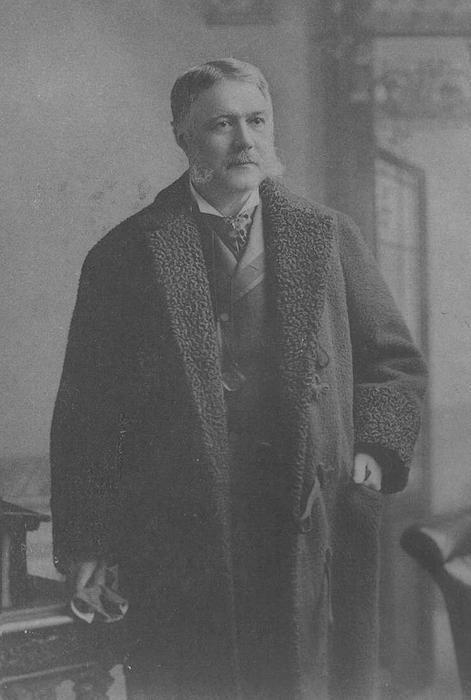
It was about two hours after midnight on September 20, 1881, and not unusual for the resident of 123 Lexington Avenue in New York City to be up at such a late hour, or to have plenty of guests. In fact, he preferred to keep late hours, entertaining friends deep into the night with late-night dinners, drinks, and endless conversation. Yet, on this night, 123 Lexington Avenue was somber and the mood was grave. Just a few hours earlier -- at 11:30 PM -- a messenger knocked on the door of Vice President Chester Alan Arthur's Manhattan brownstone and handed Arthur a telegram. Surrounded by a few friends and colleagues, Arthur read that President James A. Garfield, just 49 years old and in office for barely six months, had died in a beach cottage at Elberon, New Jersey. Turning to his friends in his sitting room, Arthur said, "I hope -- my God, I do hope it is a mistake."
On July 2nd, President Garfield was shot twice and seriously wounded by Charles Guiteau as he walked through the Baltimore & Potomac Railroad Station in Washington, D.C. with Secretary of State James G. Blaine and Secretary of War Robert Todd Lincoln (son of Abraham Lincoln) en route to a speaking engagement at his alma mater, Williams College in Massachusetts. Guiteau was a disgruntled, disturbed, and delusional office-seeker who had been pleading for an appointment as consul to Paris (though he was willing to "settle" for Vienna) despite an absence of diplomatic and political experience and a complete lack of general qualifications. Hounding Garfield throughout the early months of an Administration that had just begun on March 4, 1881, Guiteau's constant harassment of the new President finally resulted in Secretary Blaine to never return to the White House again. Guiteau felt that he had been entitled to some office, particularly an ambassadorship, and was terribly upset that Garfield and his Cabinet members refused to consider his requests. Blaine's order to stay away drove Guiteau to purchase an ivory-handled .44 British Bulldog revolver (specifically chosen because Guiteau felt that particular firearm would look good in a museum) and he began stalking Garfield throughout Washington before finally shooting him inside the rail station two days before Independence Day 1881. As police arrested him, Guiteau shouted, "I am a Stalwart of the Stalwarts...Arthur is President now!"
But Arthur wasn't President; not yet at least. Garfield was a physically robust man and relatively young in comparison to most Presidents to date. While one bullet had lodged in Garfield's spine, the other bullet grazed his arm and caused no significant damage. While it appeared that he was gravely ill immediately following the shooting, Garfield's vital signs soon started to improve and the American people began to get their hopes up about a full recovery. A vigil of sorts was underway as President Garfield convalesced in the White House, and his doctors issued regular bulletins updating his condition. Garfield's doctors also poked and prodded him with unsterilized instruments and dirty fingers to attempt to locate the bullet still inside of his body. Had they left it alone, Garfield almost certainly would have survived; his wounds were significantly less dangerous than those survived 100 years later by 70-year-old Ronald Reagan. However, the unnecessary poking and prodding resulted in a serious infection that ravaged Garfield's body, weakened his heart, left the muscular, 215-pound President emaciated, weighing less than 135 pounds, and turned the 49-year-old Garfield's dark brown beard and hair a ghastly white color. Fighting for his life in the sweltering summer heat of Washington, on September 6th it was finally agreed upon to transport Garfield to a cottage on the Jersey Shore in hopes that he could benefit from the change of scenery and from the fresh ocean air. Sadly, it was too late. The infections were accompanied by blood poisoning and pneumonia, among other ailments. On September 19th at 10:35 PM, Garfield suffered a massive heart attack and was pronounced dead. An hour later the messenger arrived at 123 Lexington Avenue.
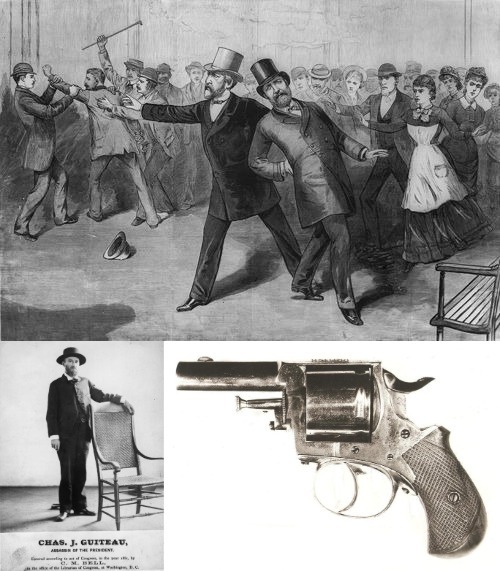
•••
The Vice Presidency was a stretch. Chet Arthur of New York as Vice President? When offered the Republican Vice Presidential nomination by James Garfield in 1880, Chester Arthur was urged by his political mentor and close friend, Stalwart leader Roscoe Conkling, to decline the appointment. Arthur, a man who had never spent a day in Congress or been elected to any office at any level, went against Conkling's wishes for perhaps the first time in his life. The Vice Presidency was certainly a stretch, but President of the United States? That was an almost frightening thought to a nation still recovering from Civil War and desperately seeking civil service reform, especially now that a disgruntled office-seeker had assassinated the President. Arthur was President left a lot of Americans worried -- some because Arthur's political background was as the powerful and somewhat shady Collector of the Port of New York, appointed during the corrupt Administration of President Ulysses S. Grant and eventually fired by President Rutherford B. Hayes during a housecleaning of corrupt institutions; and some because James Garfield's murderer had claimed to be a Stalwart and, by his own words, insinuated that Garfield's shooting might be a conspiracy on behalf of the Conkling/Arthur side of the divided Republican Party.
Chester Arthur was a creature of the era known as the "Gilded Age" and was the symbolic mascot for the widespread political corruption of the 1870s due to his position at the Port of New York. At a moment when drastic reform of the civil service was being demanded by many Americans outraged by James Garfield's assassination, Garfield's successor was a man who, for years, had been the poster boy for crony patronage and machine politics. Born in Vermont in 1829, Arthur was the son of a preacher and grew up mostly in upstate New York, graduated from Schenectady's Union College in 1848, briefly taught school while studying law, and was admitted to the bar in 1854. As his law practice grew in the 1850s, Arthur immersed himself in New York Republican politics yet never ran for office. A political appointee to the New York State Militia, he found himself serving during the Civil War and his superb organizational skills led to quick promotions all the way to quartermaster general in 1862, a position which carried the rank of brigadier general. As a political appointee to the militia, however, Arthur served at the pleasure of the Governor of New York and was forced to resign in 1862 when a Democratic Governor took office. Returning to New York City, Arthur resumed his law practice and political gamesmanship. More appointments came his way as he supported Republican candidates throughout the state and worked on national campaigns such as President Lincoln's 1864 bid for re-election and Ulysses S. Grant's 1868 Presidential campaign.
In 1871, President Grant appointed Arthur as Collector of customs as the Port of New York, which gave Arthur responsibility for about 75% of the nation's custom duties and was one of the most powerful patronage positions available in the United States government. Arthur used his office to efficiently raise money for Republican campaigns and candidates, supporting President Grant's 1872 re-election campaign by seeking (if not "requiring") contributions from his employees at the customhouse. In 1876, Arthur championed his political mentor, Senator Roscoe Conkling, for the Republican Presidential nomination, but supported Rutherford B. Hayes in the general election, once again using the employees at the customhouse to help raise money to finance the successful Republican campaign. However, once Hayes was elected, the new President made it clear that he was serious about civil service reform and that meant reforming Arthur's customhouse, too. In 1877, Arthur testified before the Jay Commission, which was formed to investigate charges of corruption and eventually recommended that President Hayes reduce the workforce of the customhouse and eliminate the corrupt elements that had worked there for so long. Due to Arthur's longtime support of the Republican Party, President Hayes offered him an appointment as consul in Paris (the same job Charles Guiteau would kill James Garfield for a few years later) in order to quietly remove him from the Port of New York. When Arthur refused the appointment, the President fired him and Arthur resumed his law practice in New York City.
When Arthur headed to the 1880 Republican National Convention at the Interstate Exposition Building in Chicago, it was as a New York delegate supporting the aspirations of former President Ulysses S. Grant who was coming out of retirement to seek an unprecedented third term. However, neither of the front-runners for the nomination -- Grant and Senator James G. Blaine of Maine -- could capture enough votes from delegates to clinch the nomination. After thirty-five ballots, Blaine and another prospective candidate, Treasury Secretary John Sherman of Ohio, threw their support behind a dark horse candidate -- Ohio Congressman James A. Garfield. On the next ballot, Garfield clinched the nomination and reached out to the opposing wing of the Republican Party for his Vice Presidential choice. The first choice, Levi P. Morton of New York (who would later serve as President Benjamin Harrison's Vice President), declined Garfield's offer, and Arthur -- who had never previously even sought an elective office -- excitedly accepted, much to the chagrin of his angry political mentor, Roscoe Conkling. Not confident in Garfield's chances for election, Conkling told Arthur, "You should drop it as you would a red-hot shot from the forge." Arthur replied, "There is something else to be said," and Conkling asked in disbelief, "What, sir, you think of accepting?". Despite the complaints and anger of Conkling, Arthur told him, "The office of Vice President is a greater honor than I have ever dreamed of attaining. I shall accept. In a calmer moment you will look at this differently."
Following the election, Arthur prepared to settle into the quiet role of Vice President during the 19th century. The Vice President of the United States has only one real responsibility -- to preside over the Senate and even that responsibility is normally delegated to Senators who rotate as presiding officer almost daily. The powerful or even influential American Vice Presidency is a fairly recent evolution, not even 50 years old. While some Vice Presidents were relied on for advice or counsel or given larger duties than others, most Vice Presidents were so far removed from the Executive Branch that they were not only kept out of the decision-making process, but also kept in the dark about certain information. For example, when President Franklin D. Roosevelt died towards the end of World War II in 1945 and was succeeded by his Vice President, Harry S. Truman, the new President had to be quickly briefed about the existence of the Manhattan Project to develop atomic weaponry. Still, the first Vice President to have an office in the White House was Walter Mondale and that didn't occur until 1977, so in 1881 a Vice President was expected to preside over the Senate on special occasions, cast a tie-breaking vote when necessary, and be available to take the oath of office if the President happened to die or resign.
Like most 19th century Vice Presidents, Chester Arthur didn't even spend much time in Washington, and he was returning to his regular home in New York City on July 2, 1881 when he stepped off a steamship with Roscoe Conkling and was told that President Garfield had been shot. In fact, the message that Arthur received first erroneously reported that Garfield was already dead and at the request of Garfield's Cabinet, the stunned Vice President immediately returned to Washington, D.C. to proceed with the next steps necessary for maintaining the continuity of government. When Arthur arrived in Washington, President Garfield's condition had improved and his recovery continued to show signs of promise as the Vice President and the nation prayed for him and held vigil throughout the summer. Shaken by rumors that he and his "Stalwart" wing of the Republican Party conspired to assassinate Garfield, Arthur returned home to New York City, hesitant to invite criticism that his continued presence in Washington was merely an eager deathwatch so that he could grab power.
Garfield clung to life for eighty excruciating days with doctors probing him in an effort to remove the bullet in his body, causing infections and leaving the President suffering from blood poisoning which led him to hallucinate at times. The Navy helped rig together an early form of air conditioning in Garfield's White House sickroom in order to give him relief from Washington's stifling summer conditions. When Garfield was taken by train to New Jersey in early-September, it was clear to many that the long vigil was nearly over. More infections set in, along with pneumonia and painful spasms of angina. When the messenger arrived at 123 Lexington Avenue just before midnight on September 20, 1881 to inform Arthur that President Garfield had died just 60 miles away, the new President wasn't surprised, but he also wasn't quite prepared. The nation worried about the lifetime political operative stepping into the position being vacated by the promising President assassinated before he could enact the civil service reforms promised in his Inaugural Address. What would Arthur -- the quintessential patronage politician -- do as President? Nobody knew, but Chester Alan Arthur had an idea. •••
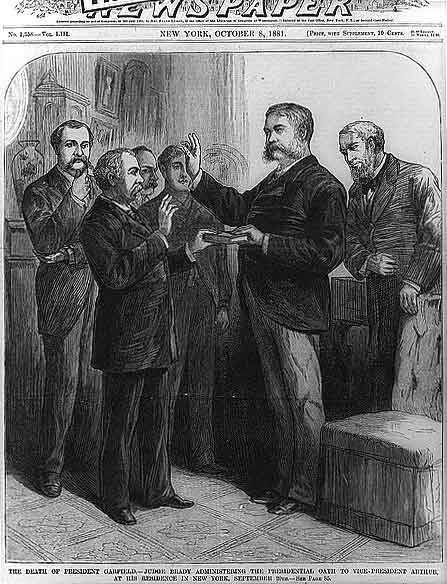
It was fitting that Arthur was surrounded by friends when he took the oath of office at his home in Manhattan at 2:15 AM on September 20, 1881. Arthur's beautiful wife, Nell, died of pneumonia in January 1880 and he was inconsolable for months, regretting for the rest of his life the fact that she never saw his election as Vice President or ascendancy to the Presidency. People who knew Arthur stated that he clearly never fully recovered from her death, and that as a "deeply emotional...romantic person," it was no surprise that he ordered that fresh flowers were placed before her portrait in the White House every day while he was President.
Chester Arthur had a lot of friends. That's what happens when you control as many lucrative patronage positions as Arthur controlled for as long as Arthur controlled them. But it wasn't just his political position that gained him friends. Arthur was a great storyteller, a man who loved to hunt and fish, kind, easy-going, charming, graceful, and smooth. During his life he was nicknamed "Elegant Arthur" and is considered one of the most stylish of Presidents. Photographs of Presidents from the 19th century typically show us men no different than statues. They dressed the same, they looked the same, and when portrayed in the black and white photos of the time, we feel no differently when we see their pictures than when we see a slab of marble carved in their image. Arthur leaps out of his photographs, however. He was a very large man for his era, standing 6'2" and weighing around 220 pounds during his Presidency. Large muttonchops connected to a bushy mustache and his close-cropped, wavy brown hair seemed to pull back his forehead and place more emphasis on expressive black eyes that easily reflected his moods. While it seems that most Presidents of the 19th century wore the same boring black suit and black tie like a uniform, Arthur's ties are patterned, jewelry is visible, collars are crisp, handkerchiefs are folded creatively, and his lapels shine as if they were polished along with his shoes. We see photographs of Arthur in fashionable overcoats, a wide variety of hats, and he employed a personal valet who helped the President change clothes for every occasion -- he was said to have over 80 pairs of pants.
Most apparent of all is that Arthur was a gentleman -- an interesting man with superb social skills and fastidious manners. Even as one of the top operatives in New York's Republican political machine of the corrupt 1870s, he was nicknamed the "Gentleman Boss." As President, he brought entertainment back to the White House -- something that had been missing on a large scale since before the Civil War twenty years earlier. His predecessor, Rutherford B. Hayes, was one of the few critics of this development, stating that there was "nothing like it before in the Executive Mansion -- liquor, snobbery, and worse." Arthur also redecorated the White House, hiring Louis Comfort Tiffany to help with the design. To help raise money for the redecoration, Arthur basically held a White House yard sale. On the lawn of the mansion, twenty-four wagons full of history (including a pair of Abraham Lincoln's pants that had been left behind in a closet) were sold to citizens. To some, the items were priceless; to President Arthur, they were ugly and a man like Chester Arthur did not live in an ugly home. Several weeks after Garfield died, Arthur got his first look at his new home and quickly stated, "I will not live in a house like this." He didn't end up moving into the White House until three months into his Presidency.
•••
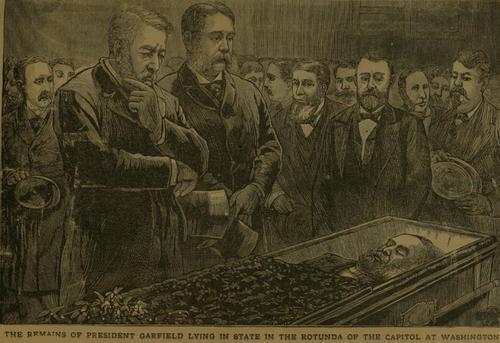
[Secretary of State James G. Blaine, President Arthur, and former President Ulysses S. Grant, view the open casket of President James A. Garfield as he is lying in state in the Capitol Rotunda.]
After taking the oath of office at home in Manhattan in the early hours of September 20, 1881, now-President Arthur proceeded to Washington, D.C., stopping in Long Branch, New Jersey to pay respects to the late President Garfield and his grieving family. Once Arthur succeeded to the Presidency upon Garfield's death, there was no Vice President, no president pro tempore of the Senate, and no Speaker of the House (Congress has not elected its leadership yet), thus, there was no Constitutional line of succession. If something had happened to Arthur at that moment, the United States would have faced an unprecedented Constitutional crisis. As his first act as President, Arthur immediately called the Senate into session in order to select their leadership positions and position someone in the line of succession. Upon arriving in Washington, Attorney General Wayne MacVeagh suggested that Arthur take a second oath of office and he did so at the U.S. Capitol on September 22nd, in the presence of Garfield's Cabinet, members of Congress, Supreme Court Justices, and former Presidents Grant and Hayes.
Americans worried about the former machine politician's integrity were transformed quickly as Chester Arthur underwent something of a transformation himself. Widely considered a lapdog of New York's Roscoe Conkling, Arthur broke ranks with the party boss and pushed for the same civil service reform championed by James Garfield prior to the assassination. Arthur's former associates in the New York Republican Party were disappointed when he declined their requests for political favors. One former colleague sadly reported, "He isn't 'Chet' Arthur anymore. He's the President." Arthur found that the transformation was almost automatic and out of his control, noting that "Since I came here I have learned that Chester A. Arthur is one man and the President of the United States is another." His old benefactor, Conkling, was one critic of the new President, complaining "I have but one annoyance with the Administration of President Arthur and that is, in contrast with it, the Administration of Hayes becomes respectable, if not heroic." Arthur signed the Pendleton Act in 1883 which created a modern civil service system and eliminated the spoils system that had long dominated American politics. This reform, which Conkling called "snivel service" was the final break between the longtime friends and colleagues.
To the American people, the great surprise of an Arthur Administration was the fact that it was clean, honest, and efficient. Arthur helped lift the gloomy moods that had shadowed Washington throughout the Civil War, Lincoln's assassination, Reconstruction, the corruption of the Gilded Age, the wildly controversial Election of 1876, and Garfield's assassination. His popularity rose throughout his term and most critics focused on his lavish entertainment or the fact that he was notoriously late for meetings and seemed bored or lethargic at times. He often procrastinated -- as a White House clerk once said, "President Arthur never did today what he could put off until tomorrow." Still, most Americans were happy with President Arthur and echoed the thoughts of Mark Twain who said, "I am but one in 55 million; still, in the opinion of those one-fifty-five-millionth of the country's population, it would be hard to better President Arthur's Administration."
He was bored, though. President Arthur didn't like being President. He enjoyed the entertaining dinners that he could throw and loved public events or ceremonies that allowed him to meet the people of the United States, but the desk work was tedious and he wasn't interested in policy. Arthur stayed up late and seemed to vacation often, which perplexed many people because it was said that he was constantly exhausted. What they didn't know was that from almost the time he became President, Chester Arthur was dying. In 1882, he was diagnosed with Bright's disease, a fatal kidney ailment at the time. Despite reports that he was suffering from the disease, Arthur hid it from the public, desperately protecting his privacy, as always. Arthur's distaste for the Presidency probably stemmed in part from depression triggered by the Bright's disease. At times, Arthur suffered from debilitating illness and it was always covered with a story about the President catching a cold during a fishing trip or spending too much time in the sun while hunting. In a letter to his son, Alan, in 1883, the President confided, "I have been so ill that I have hardly been able to dispose of the...business before me."
Despite his popularity, Republican leaders opposed Arthur's nomination for a term as President in his own right in 1884. The man who opposed it most, however, was the President himself, who stated "I do not want to be reelected." Not only was he disinterested in a second term, but he knew very well that there was a possibility he might not even survive to the end of his current term. He did, and after attending the inauguration of his successor, Grover Cleveland, on March 4, 1885, Arthur returned home to New York City where his health rapidly declined. The former President was aware that he was dying and made plans for a relatively quiet retirement, deciding to practice law, but doing very little work due to his health. When asked about his future, Arthur said, "There doesn't seem anything for an ex-President to do but to go out in the country and raise big pumpkins." On November 16, 1886, Arthur suffered a stroke that paralyzed his left side. Gravely ill, he called his son to his bedside the day before his death and had all of his public and private papers stuffed into trash cans and burned. On November 18, 1886, the 57-year-old former President died in the same place he became President just five years earlier, 123 Lexington Avenue in New York City. After a quiet funeral at the Church of Heavenly Rest on Fifth Avenue in New York, Arthur's remains were buried next to his beloved wife at Rural Cemetery in Albany, New York.
•••
When President Arthur had many of his personal papers burned prior to his death, he eliminated one of the best sources of information about his life and career for future historians. With a thin resume and a fairly uneventful Presidency, there wasn't much public information about his career, either. This leaves us with very little to remember Chester Alan Arthur by. Research on his life -- particularly his personal life -- is difficult, and Arthur would have appreciated that. During his Presidency, leaders of the temperance movement called on Arthur and urged him to follow the non-alcoholic lifestyle led by President Hayes and his teetotaler wife, who became known as "Lemonade Lucy".
Arthur's response: "Madam, I may be President of the United States, but my private life is nobody's damn business."
And so it isn't.
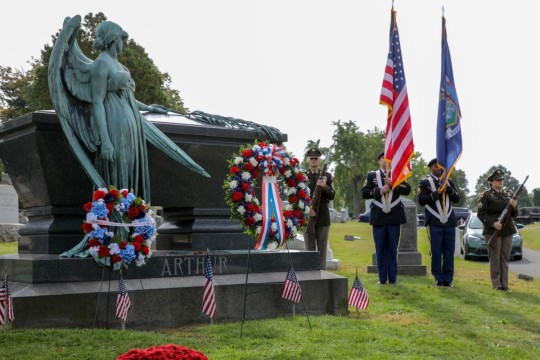
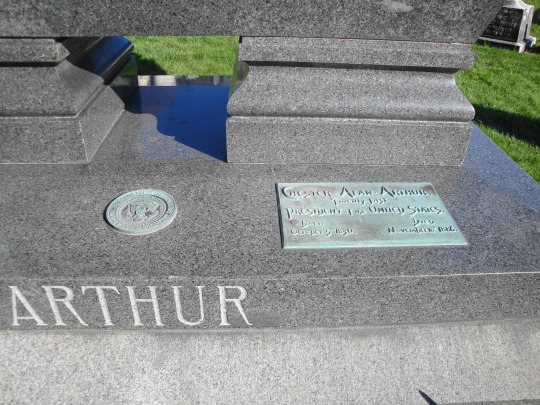
#History#Presidents#Chester A. Arthur#Chester Alan Arthur#President Arthur#Arthur Administration#Presidential History#Presidency#Writings#Essays#Original Essays#The Elegant Mr. Arthur#James A. Garfield#President Garfield#Garfield Administration#Presidential Assassinations#Assassination of James Garfield#Garfield Assassination#1880 Election#Election of 1880#Gilded Age#New York Politics#Charles Guiteau#Roscoe Conkling#Vice Presidents#Vice President Arthur#Presidential Succession
40 notes
·
View notes
Text
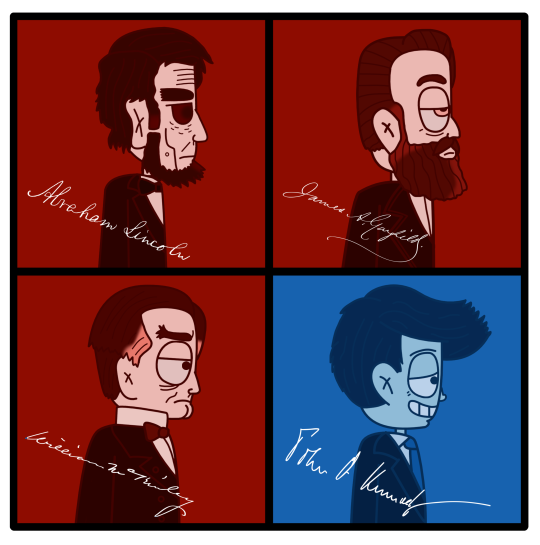
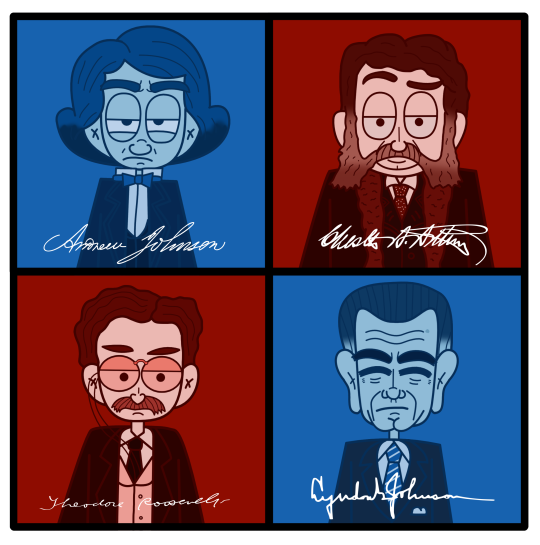
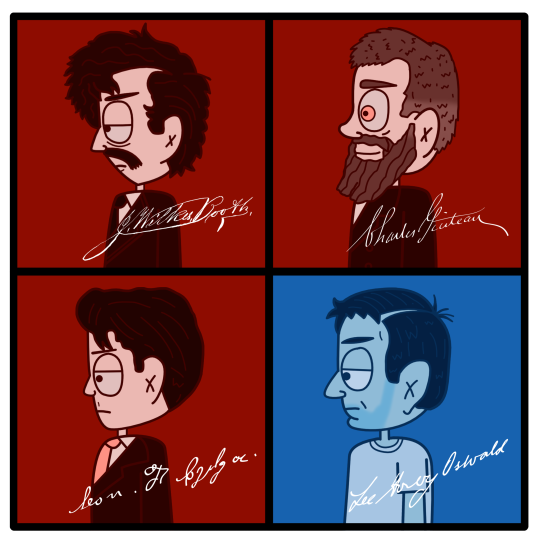
Finished the set and tweaked a bit of the proporations.
#my art#presidents day#its over but...#us presidents#us history#american president#american history#potus#historical figures#abraham lincoln#james a garfield#james abram garfield#william mckinley#john fitzgerald kennedy#jfk#john f kennedy#andrew johnson#chester a arthur#chester alan arthur#theodore roosevelt#lyndon b. johnson#lbj#lyndon baines johnson#john wilkes booth#charles j guiteau#Charles julius guiteau#charles guiteau#leon czolgosz#leon frank czolgosz#lee harvey oswald
12 notes
·
View notes
Text
When did President Chester Alan Arthur become a tumblr sexyman?

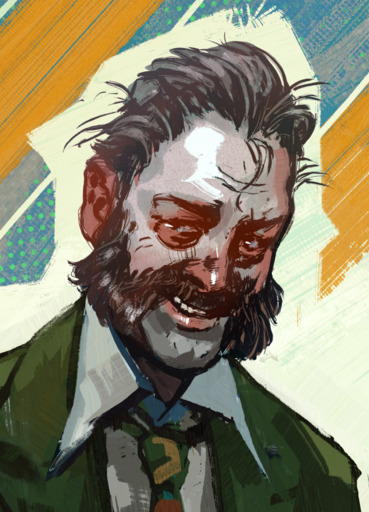
#sideburns#muttonchops#chester alan arthur#harry du bois#disco elysium#i don't go here#tumblr sexyman
14 notes
·
View notes
Text
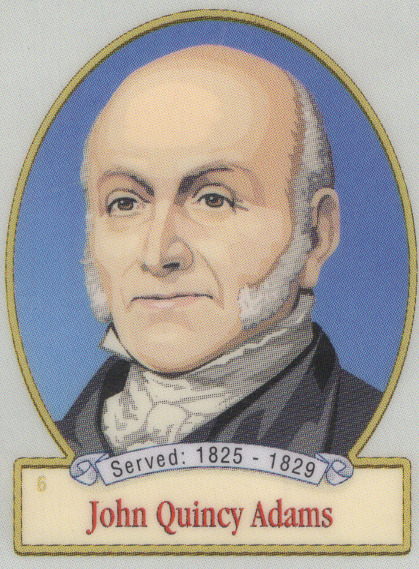
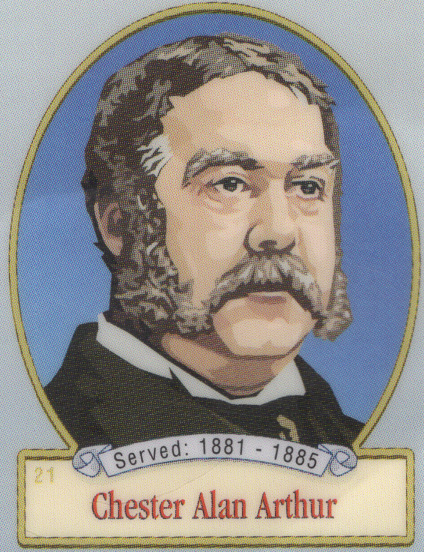
#Round 2#Poll#President#Presidents#President of the United States#US President#Presidential Poll#America#Tumblr Poll#Tournament Poll#John Quincy Adams#Chester Alan Arthur#Note: we do NOT own this artwork
1 note
·
View note
Text
Give this album a listen: Reimagining In The Court Of The Crimson King
#various artists#reimagining in the court of the crimson king#todd rundgren#arthur brown#mel collins#chris poland#ian paice#django jakszyk#jakko jakszyk#alan davey#paul rudolph#nik turner#adam hamilton#danny faulkner#joe lynn turner#marty friedman#jah wobble#chester thompson#james labrie#carmine appice#steve hillage#brian auger#king crimson#in the court of the crimson king#Spotify
0 notes
Text
Names used in the Reach
(according to books; names of characters from houses in the Reach)
- next to the names are either houses which have a character/s with that name or culture of the character/s with that name
Female
Alerie (Hightower)
Alicent (Hightower)
Alla (Tyrell)
Alyce (Graceford)
Alys (Oakheart)
Alysanne (Bulwer, Hightower, Osgrey)
Arwyn (Oakheart)
Bethany (Hightower, Redwyne)
Ceryse (Hightower)
Clarice (Osgrey)
Delena (Florent)
Denyse (Hightower)
Desmera (Redwyne)
Elinor (Costayne, Tyrell)
Ellyn (Beesbury)
Elyn (Norrridge)
Falia (Reachman)
Florence (Fossoway)
Florys (Reachman)
Helicent (Uffering)
Janna (Tyrell)
Jeyne (Fossoway, Merryweather, Rowan)
Leona (Tyrell)
Leonette (Fossoway)
Leyla (Hightower)
Lia (Serry)
Lynesse (Hightower)
Lysa (Meadows)
Malora (Hightower)
Margaery (Tyrell)
Megga (Tyrell)
Melara (Crane)
Melessa (Florent)
Meredyth (Crane)
Mina (Tyrell)
Myrielle (Peake)
Olene (Tyrell)
Olenna (Redwyne)
Patrice (Hightower)
Patricia (Redwyne)
Rhea (Florent)
Rohanne (Webber)
Rosamund (Ball)
Rose (Crane)
Rowan (Rowan)
Rylene (Florent)
Samantha (Tarly)
Sansara (Tarly)
Selyse (Florent)
Sharis (Footly)
Talla (Tarly)
Victaria (Tyrell)
Yrma (Peake)
Male
Abelar (Hightower)
Addam (Hightower, Osgrey)
Aegon (Ambrose)
Aemon (Costayne)
Agramore (Cobb)
Aladore (Florent)
Alan (Beesbury, Tarly)
Alekyne (Florent)
Alester (Florent, Norcross, Oakheart, Tyrell)
Alton (Beesbury)
Alyn (Ambrose, Ashford, Cockshaw, Hunt)
Amaury (Peake)
Androw (Ashford)
Armen (Peake)
Armond (Caswell)
Arthor (Oakheart)
Arthur (Ambrose)
Arys (Oakheart)
Aubrey (Ambrose)
Axell (Florent)
Baelon (Hightower)
Barris (Hightower)
Barquen (Peake)
Bayard (Norcross)
Ben (Beesbury, Bushy)
Bertrand (Tyrell)
Bors (Bulwer)
Buford (Bulwer)
Branston (Cuy)
Braxton (Beesbury)
Bryan (Fossoway)
Bryndon (Hightower)
Cleyton (Caswell)
Clifford (Conklyn)
Colin (Florent)
Damon (Hightower)
Desmond (Redwyne)
Denys (Oakheart, Redwyne, Woodwright)
Derrick (Fossoway)
Dickon (Tarly)
Donald (Tarly)
Donnel (Hightower)
Dorian (Hightower)
Eden (Risley)
Eddison (Peake)
Edgar (Sloane)
Edgerran (Oakheart)
Edmund (Ambrose, Gardener)
Edwyd (Fossoway, Osgrey)
Ellard (Crane)
Elwood (Blackbar, Meadows)
Elyas (Willum)
Emerick (Peake)
Emmon (Cuy)
Erren (Florent)
Eustance (Hightower, Osgrey)
Franklyn (Reachman)
Foss (Fossoway)
Gareth (Gardener, Tyrell)
Garlan (Tyrell)
Garland (Gardener)
Garmon (Hightower)
Garmund (Hightower)
Garrett (Reachman)
Garse (Gardener)
Garth (Gardener, Hightower, Oldflowers, Tyrell)
Gawen (Gardener)
Gedmund (Peake)
George (Graceford)
Gerold (Hightower)
Gilbert (Redwyne)
Gordan (Gardener)
Gormon (Peake, Tyrell)
Glendon (Hewett)
Greydon (Gardener)
Gunthor (Hightower)
Guthor (Grimm)
Gwayne (Gardener, Hightower, Oakheart)
Gyles (Gardener)
Harlan (Tyrell)
Harlon (Tarly)
Harrold (Osgrey)
Harys (Cobb, Graceford)
Herndon (Tarly)
Hobber (Redwyne)
Horas (Redwyne)
Hosman (Norcross)
Humfrey (Beesbury, Hewett, Hightower)
Humphrey (Bulwer)
Hyle (Hunt)
Igon (Vyrwel)
Imry (Florent)
Jack (Bulwer)
Jafer (Reachman)
Jason (Hightower)
Jeffory (Norcross)
Jeremy (Hightower, Norridge)
Joffrey (Caswell)
John (Gardener, Oakheart)
Jon (Bulwer, Florent, Fossoway, Hightower, Roxton)
Josua (Willum)
Laswell (Peake)
Leo (Blackbar, Costayne, Tyrell)
Leyton (Hightower)
Loras (Tyrell)
Lorence (Roxton)
Lorent (Tarly, Tyrell)
Lorimar (Peake)
Lucantine (Woodwright)
Lucas (Inchfield, Leygood, Tyrell)
Luthor (Tyrell)
Lyman (Beesbury)
Lymond (Hightower)
Lyonel (Hightower, Tyrell)
Mace (Tyrell)
Manfred (Hightower)
Manfryd (Redwyne)
Mark (Mullendore)
Marq (Ambrose, Merryweather)
Martyn (Hightower, Mullendore, Tyrell)
Matthew (Mullendore)
Matthos (Tyrell)
Medwick (Tyrell)
Merle (Gardener)
Mern (Gardener)
Merrell (Florent)
Mervyn (Reachman)
Meryn (Gardener, Peake)
Morgan (Hightower)
Moribald (Chester)
Morgil (Hastwyck)
Moryn (Tyrell)
Myles (Hightower)
Norman (Hightower)
Normund (Tyrell)
Nyles (Rowan)
Olymer (Tyrell)
Olyvar (Oakheart)
Omer (Florent)
Orbert (Caswell)
Ormond (Osgrey)
Ormund (Hightower)
Orton (Merryweather)
Osmund (Tyrell)
Otho (Hightower)
Otto (Hightower)
Ottyn (Wythers)
Owen (Costayne, Fossoway, Inchfield, Merryweather)
Parmen (Crane)
Paxter (Redwyne)
Perceon (Gardener)
Peremore (Hightower)
Perwyn (Osgrey)
Portifer (Woodwright)
Pykewood (Peake)
Quentin (Tyrell)
Quenton (Hightower)
Quentyn (Ball)
Randyll (Tarly)
Raymun (Fossoway)
Raymund (Tyrell)
Renly (Norcross)
Reynard (Webber)
Rickard (Redwyne, Rowan, Tyrell)
Robert (Ashford, Redwyne, Rowan, Tyrell)
Robyn (Rhysling)
Rolland (Uffering)
Runceford (Redwyne)
Runcel (Hightower)
Russell (Merryweather)
Ryam (Florent, Redwyne)
Rycherd (Crane)
Samwell (Tarly)
Samwyle (Tarly)
Simon (Leygood)
Steffon (Fossoway, Varner)
Talbert (Serry)
Tanton (Fossoway)
Thaddeus (Rowan)
Theo (Tyrell)
Theodore (Tyrell)
Titus (Peake)
Tom (Costayne)
Tommen (Costayne)
Torgen (Oakheart)
Torman (Peake)
Triston (Hightower)
Tyler (Norcross)
Unwin (Peake)
Urrathon (Peake)
Urrigon (Hightower)
Uther (Peake)
Uthor (Hightower)
Victor (Risley, Tyrell)
Vortimer (Crane)
Walys (Reachman)
Wendell (Webber)
Wilbert (Osgrey)
Willam (Wythers)
Willas (Tyrell)
Wyman (Webber)
#studyofasoiaf#a song of ice and fire#asoiaf#asoiaf fandom#asoiafwiki#asoiaf world#asoiaf worldbuilding#game of thrones#asoiaf fic#the reach
39 notes
·
View notes
Text
Donald
1 George Washington 1732-1799 Indépendant 1789-1797
2 John Adams 1735-1826 Parti fédéraliste 1797-1801
3 Thomas Jefferson 1743-1826 Parti républicain-démocrate 1801-1809
4 James Madison 1751-1836 Parti républicain-démocrate 1809-1817
5 James Monroe 1758-1831 Parti républicain-démocrate 1817-1825
6 John Quincy Adams 1767-1848 Parti républicain-démocrate 1825-1829
7 Andrew Jackson 1767-1845 Parti démocrate 1829-1837
8 Martin Van Buren 1782-1862 Parti démocrate 1837-1841
9 William Henry Harrison 1773-1841 Parti whig 1841
10 John Tyler 1790-1862 Parti whig 1841-1845
11 James Knox Polk 1795-1849 Parti démocrate 1845-1849
12 Zachary Taylor 1784-1850 Parti whig 1849-1850
13 Millard Fillmore 1800-1874 Parti whig 1850-1853
14 Franklin Pierce 1804-1869 Parti démocrate 1853-1857
15 James Buchanan 1791-1868 Parti démocrate 1857-1861
16 Abraham Lincoln 1809-1865 Parti républicain 1861-1865
17 Andrew Johnson 1808-1875 Parti démocrate 1865-1869
18 Ulysses Simpson Grant 1822-1885 Parti républicain 1869-1877
19 Rutherford Birchard Hayes 1822-1893 Parti républicain 1877-1881
20 James Abram Garfield 1831-1881 Parti républicain 1881
21 Chester Alan Arthur 1829-1886 Parti républicain 1881-1885
22 Grover Cleveland 1837-1908 Parti démocrate 1885-1889
23 Benjamin Harrison 1833-1901 Parti républicain 1889-1893
24 Grover Cleveland 1837-1908 Parti démocrate 1893-1897
25 William McKinley 1843-1901 Parti républicain 1897-1901
26 Theodore Roosevelt 1858-1919 Parti républicain 1901-1909
27 William Howard Taft 1857-1930 Parti républicain 1909-1913
28 Woodrow Wilson 1856-1924 Parti démocrate 1913-1921
29 Warren Gamaliel Harding 1865-1923 Parti républicain 1921-1923
30 Calvin Coolidge 1872-1933 Parti républicain 1923-1929
31 Herbert Clark Hoover 1874-1964 Parti républicain 1929-1933
32 Franklin Delano Roosevelt 1882-1945 Parti démocrate 1933-1945
33 Harry S. Truman 1884-1972 Parti démocrate 1945-1953
34 Dwight D. Eisenhower 1890-1969 Parti républicain 1953-1961
35 John Fitzgerald Kennedy 1917-1963 Parti démocrate 1961-1963
36 Lyndon Baines Johnson 1908-1973 Parti démocrate 1963-1969
37 Richard Milhous Nixon 1913-1994 Parti républicain 1969-1974
38 Gerald R. Ford 1913-2006 Parti républicain 1974-1977
39 Jimmy Carter 1924-2024 Parti démocrate 1977-1981
40 Ronald Wilson Reagan 1911-2004 Parti républicain 1981-1989
41 George Herbert Walker Bush 1924-2018 Parti républicain 1989-1993
42 Bill Clinton*1946 Parti démocrate 1993-2001
43 George W. Bush*1946 Parti républicain 2001-2009
44 Barack Hussein Obama II.*1961 Parti démocrate 2009-2017
45 Donald John Trump*1946 Parti républicain 2017-2021
46 Joseph “Joe” Robinette Biden, Jr.*1942 Parti démocrate 2021-2025
47 Donald John Trump*1946 Parti républicain 2025-2029
40 notes
·
View notes
Text
favourite poems of october
alfred starr a dark dreambox of another kind: the poems of alfred starr: "didn't you ever search for another star?
stephen spender new collected poems: "auden's funeral"
marianne boruch keats is coughing
noa micaela fields zoeglossia: poem of the week, may 17, 2021: "echolalia"
kevin young diptych
richard siken real estate
crisosto apache kúghą/home
mikko harvey for m
nathan hoks nests in air: "the barbed wire nest"
john a. holmes noon waking
crisosto apache 37 common characterisi(x)s of a displaced indian with a learning disability
oliver de la paz requiem for the orchard: "at the time of my birth"
zhang xun jiangnan song (tr. bijaan noormohamed)
paul violi fracas: "extenuating circumstances"
tianru wang after "yellow crane tower"
lloyd schwartz cairo traffic: "nostalgia (the lake at night)"
kamiko han the narrow road to the interior: "the orient"
rigoberto gonzalez unpeopled eden: "unpeopled eden"
adelaide crapsey verse: "to the dead in the graveyard underneath my window"
chester kallman night music
alan shapiro covenant: "covenant"
tom clark light and shade: new and selected poems: "radio"
tc tolbert my melissa,
charlie smith in praise of regret
carolyn kizer cool, calm, and collected: poems 1960-2000: "fanny"
julie sheehan orient point: "hate poem"
arthur sze the redshifting web: poems 1970-1998: "streamers"
joumana altallal everything here...in the voice of tara fares
abid b al-abras last simile
w.s. merwin to lingering regrets
george scarbrough music
shout me a coffee
#tbr list#poems#poetry#poetry list#poem list#poet#poets#alfred starr#a dark dreambox of another kind#didn't you ever search for another star?#stephen spender#new collected poems#auden's funeral#marianne boruch#keats is coughing#noa micaela fields#echolalia#zoeglossia#oliver de la paz#requiem for the orchard#at the time of my birth#paul violi#fracas#extenuating circumstances#lloyd schwartz#cairo traffic#nostalgia (the lake at night)#rigoberto gonzalez#unpeopled eden#tom clark
226 notes
·
View notes
Text
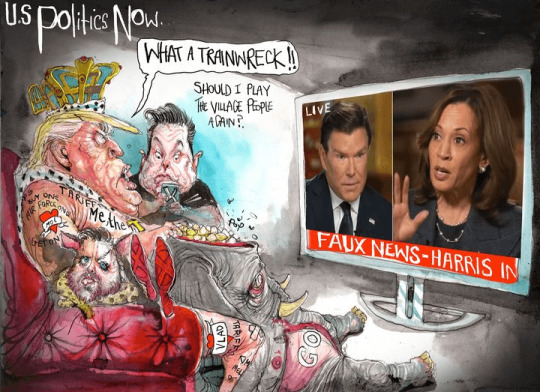
David Rowe
* * * *
LETTERS FROM AN AMERICAN
A number of people telling me we all need a night off had almost convinced me not to write tonight.
But then Trump spoke at a rally in Latrobe, Pennsylvania, where he told a long, meandering story about golfing legend Arnold Palmer that ended with praise for Palmer’s… anatomy.
He went on to call Vice President Kamala Harris—whose name he deliberately mispronounced—“a sh*t vice president. The worst. You’re the worst vice president. Kamala, you’re fired. Get the hell out of here, you’re fired. Get out of here. Get the hell out of here, Kamala.”
As Trump’s remarks got weirder and weirder, the Fox News Channel cut away and instead showed Harris being cheered at a packed, exuberant, super-charged rally in Georgia.
Trump’s speech comes on top of his repeated backing out of interviews and his bizarre appearances. Last night, his advice to an audience in Detroit to vote took its own wild turn: “Jill, get your fat husband off the couch,” he said. “Get that fat pig off the couch. Tell him to go and vote for Trump, he’s going to save our country. Get that guy the hell off our— get him up, Jill, slap him around. Get him up. Get him up, Jill. We want him off the couch to get out and vote.”
Trump’s performances over the past few days seem to confirm that the 2024 October surprise is the increasingly obvious mental incapacity of the Republican candidate for president.
It seems clear that a vote for Trump is really a vote for his running mate, Ohio senator J.D. Vance, who if he becomes president will be the youngest American president in our history. At 40 years old, he is two years younger than Theodore Roosevelt was when he took office in 1901 at 42. Vance would also be one of the least experienced presidents ever. His 18 months in the Senate has given him only slightly more experience in office than Chester Alan Arthur, who succeeded James Garfield in 1881. Arthur was a political operative who had never held elected office at all before becoming vice president.
I’ll be back at the wheel tomorrow.
LETTERS FROM AN AMERICAN
HEATHER COX RICHARDSON
#MAGA crazy#TFG#election 2024#campaign rallys#Letters From An American#Heather Cox Richardson#bizarro world#curioser and curioser
15 notes
·
View notes
Text
Information
Appendix
Atomic Robo
• Dr. Atomic Robo Tesla x Jenkins
Camp Here And There
• Elijah Volkov x Sydney Sargent
• Elijah Volkov x Up and Adam
Critical Role
• Percival Fredrickstein Von Musel Klossowski de Rolo III x Vex'ahlia
Dracula
• Jonathan Harker x Mina Murray
• John Seward x Arthur Holmwood x Quincey P Morris
• Main Dracula Cast
Frankenstein
• Victor Frankenstein x Henry Clerval
Malevolent
• Arthur Lester x John Doe
• Arthur Lester x John Doe x Noel x Oscar
• Arthur Lester x Kayne
• John Doe x Kayne
Nevermore Webtoon
• Duke x Pluto
• Lenore x Annabel Lee
Team Fortress 2
• Heavy x Medic
The Magnus archives
• Agnes Montague x Gertrude Robinson
• Archive Employees
• Elias Bouchard x Peter Lucas
• Gertrude Robinson x Jurgen Leitner
• Helen Richardson x Melanie King
• Helen Richardson x Simon Fairchild
• Jane Prentiss x Mike Crew
• Jonah Magnus x Barabas
• Jonathan Sims x Elias Bouchard
• Jonathan Sims x Gerard Keay
• Jonathan Sims x Martin Blackwood
• Jonathan Sims x Michael Shelley
• Jonathan Sims x Oliver Banks
• Jonathan Sims x Timothy Stoker
• Martin Blackwood x Michael Crew
• Michael Shelley x Gerard Keay
• Michael Shelley x Mike Crew
• Michael Shelley x Mike Crew x Mikaele Salesa
• Oliver Banks x Mike Crew
• Simon Fairchild x Peter Lucas
The Magnus Protocol
• Alice Dyer x Colin Becher
• Alice Dyer x Colin Becher x Fr3-d1
• Alice Dyer x FR3-d1
• Alice Dyer x Gwendolyn Bouchard
• Chester x Norris
• Colin Becher x FR3-d1
• Needles x Mr. Bonzo
• OIAR Employees
• Samama Khalid x FR3-d1
• Samama Khalid x Colin Becher
The Mechanisms
• Galahad x Drumbot Brian
• Jonny d’Ville x Gunpowder Tim
• Lyfrassir Edda x Marius Von Raum
• Prisoners of the Midguardian Transport Police
Cross-ships (miscellaneous)
• Adelard Dekker x Lena Kelley
• Peter Lukas x Gordon Alan Johnson
Rules for submitting posts
try to provide as much accuracy as possible with the information you put on your post
Make sure to use the same format used in all the other posts.
Tagging should go as follows: #all ship names listed #name of media and/or common abbreviations #character x other character #character #other character
If needed I can edit your post to to fit the format
Mod can refuse to upload your ship at their discretion. Something that may cause this happen but isn’t limited to, is the ship making them uncomfortable.
Post format
Ship names for Character x Other Character
Ship name
Other ship name (optional)
These characters are from piece of media.
#shipname #other ship name #piece of media #common abrieviations for piece of media #character #other character
2 notes
·
View notes
Text
The Elegant Mr. Arthur
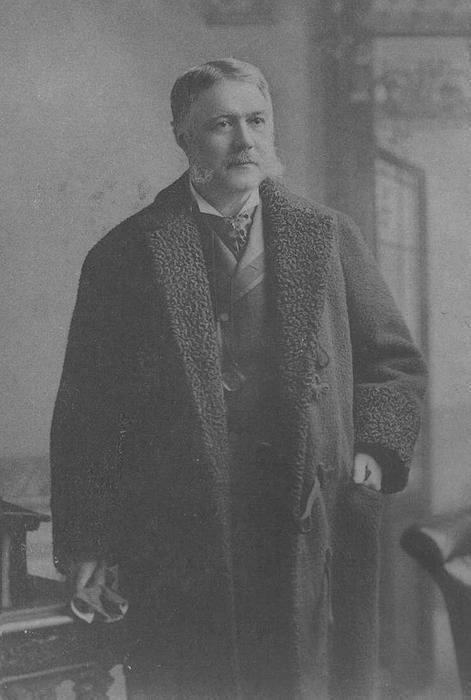
It was about two hours after midnight on September 20, 1881, and not unusual for the resident of 123 Lexington Avenue in New York City to be awake at such a late hour or to have plenty of guests. In fact, he preferred to keep late hours, entertaining friends deep into the night with late-night dinner, drinks, and endless conversation. Yet, on this night, 123 Lexington Avenue was somber and the mood was grave. Just a few hours earlier -- at 11:30 PM -- a messenger knocked on the door of Vice President Chester Alan Arthur's Manhattan brownstone and handed Arthur a telegram. Surrounded by a few friends and colleagues, Arthur read that President James Garfield, just 49 years old and in office for almost exactly 200 days, had died at a beach cottage rough 60 miles away, in Elberon, New Jersey. Turning to his friends in his sitting room, Arthur said, "I hope -- my God, I do hope it is a mistake."
On July 2nd, President Garfield was shot twice and seriously wounded by Charles Guiteau as he walked through the Baltimore & Potomac Railroad Station in Washington, D.C. with Secretary of State James G. Blaine and Secretary of War Robert Todd Lincoln (son of Abraham Lincoln), en route to a speaking engagement at his alma mater, Williams College in Massachusetts. Guiteau was a disgruntled, disturbed, and delusional office-seeker who had been pleading for an appointment as consul to Paris despite an absence of diplomatic or political experience and a complete lack of qualifications. Hounding Garfield throughout the early months of an Administration that had just begun on March 4, 1881, Guiteau's constant harassment of the new President finally resulted in Secretary Blaine ordering Guiteau to never return to the White House again. Guiteau felt that he had been entitled to some office, particularly a high-profile ambassadorship, and was terribly upset that Garfield and his Cabinet members refused to consider his requests. Blaine's order to stay away drove Guiteau to purchase an ivory-handled .44 British Bulldog revolver (specifically chosen because Guiteau felt that particular firearm would look good in a museum) and he began stalking Garfield throughout Washington before finally shooting him in the rail station two days before Independence Day 1881. As police arrested him, Guiteau shouted, "I am a Stalwart of the Stalwarts...Arthur is President now!"
But, Arthur wasn't President; not yet at least. Garfield was a physically robust man and relatively young in comparison to most Presidents. Although one bullet had lodged in Garfield's spine, the other bullet grazed his arm and caused no significant damage. While it appeared that he was gravely immediately following the shooting, Garfield's vital signs soon started to improve and the American people began to get their hopes up about a full recovery. A vigil of sorts was underway as President Garfield convalesced in the White House, and his doctors issued regular bulletins updating his condition. Garfield's doctors also poked and prodded with unsterilized instruments and dirty fingers to attempt to locate the bullet still inside of the President's body. Had they left it alone, Garfield almost certainly would have survived; his wounds were significantly less dangerous than those survived by Ronald Reagan 100 years later. However, the unnecessary poking and prodding resulted in a serious infection that ravaged Garfield's body, weakened his heart, and left the muscular, 215-pound President emaciated and weighing less than 135 pounds. After fighting for his life in the sweltering summer heat of Washington, on September 6th it was finally decided to transport Garfield to a cottage on the Jersey Shore in hopes that he could benefit from the fresh ocean air. Sadly, it was too late. The infections were accompanied by blood poisoning and pneumonia, among other ailments. On September 19th, at 10:35 PM, Garfield suffered a massive heart attack and was pronounced dead. In the 79 days since he had been shot, Garfield had lost over 80 pounds and the 49-year-old President's dark brown hair and beard had turned a ghastly white color. An hour later, the messenger arrived at 123 Lexington Avenue.
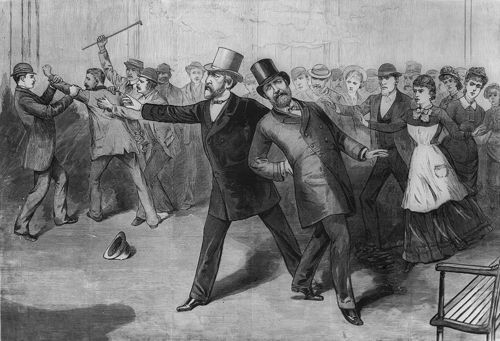
•••
The Vice Presidency was a stretch. Chet Arthur of New York as Vice President? When offered the Republican Vice Presidential nomination by James Garfield in 1880, Chester Arthur was urged by his political mentor, the leader of the Stalwart branch of the Republican Party, Senator Roscoe Conkling of New York, to decline the appointment. Arthur, a man who had never spent a day in Congress or been elected to any office at any level, couldn't turn down such an unexpected opportunity. He accepted the nomination and was elected alongside Garfield in November 1880, but most of the country (rightfully) saw Arthur as the poster boy for a machine politician elevated by the spoils system. The Vice Presidency was certainly a stretch for Chester Arthur, but President of the United States? That was an almost frightening thought to a nation still recovering from Civil War and desperately seeking civil service reform, especially now that a disgruntled office-seeker has assassinated the President. The idea of Arthur as President left a lot of Americans worried -- some because Arthur's political background was as the powerful and somewhat shady Collector of the Port of New York, appointed during the controversial Administration of President Ulysses S. Grant and eventually fired by President Rutherford B. Hayes during a housecleaning of corrupt institutions; and some because James Garfield's murderer had claimed to be a Stalwart and, by his own words, insinuated that Garfield's shooting might be a conspiracy on behalf of Arthur's faction of the divided Republican Party.
Chester Arthur was a creature of the era known as the "Gilded Age" and was the symbolic mascot for the widespread corruption of the 1870's due to his position at the Port of New York. Born in Vermont in 1829, Arthur was the son of a preacher and grew up mostly in upstate New York, graduated from Schenectady's Union College in 1848, briefly taught school was studying law, and was admitted to the bar in 1854. As his law practice grew in the 1850's, Arthur immersed himself in New York Republican politics yet never ran for office. A political appointee to the New York State Militia, he found himself serving during the Civil War and his superb organizational skills led to quick promotions all the way to quartermaster general in 1862, a position which carried the rank of brigadier. As a political appointee to the militia, however, Arthur served at the pleasure of the Governor of New York and was forced to resign in 1862 when a Democratic Governor took office. Returning to New York City, Arthur resumed his law practice and political gamesmanship. More appointments came his way as he supported Republican candidates throughout the state and worked on national campaigns such as President Lincoln's 1864 bid for re-election and Ulysses S. Grant's 1868 Presidential campaign.
In 1871, President Grant appointed Arthur as Collector of customs at the Port of New York, which gave Arthur responsibility for about 75% of the nation's customs duties and was one of the most powerful patronage positions available in the United States government. Arthur used his office to efficiently raise money for Republican campaigns and candidates, supporting President Grant's 1872 re-election campaign by seeking contributions from his employees at the customhouse. In 1876, Arthur championed his political mentor, Roscoe Conkling, for the Republican Presidential nomination, but supported Rutherford B. Hayes in the general election, once again using the employees at the customhouse to help raise money to finance the successful Republican campaign. However, once Hayes was elected, the new President made it clear that he was serious about civil service reform and that meant reforming Arthur's customhouse, too. In 1877, Arthur testified before the Jay Commission, which was formed to investigate charges of corruption and eventually recommended that President Hayes reduce the workforce of the customhouse and eliminate the corrupt elements that had worked there for so long. Due to Arthur's longtime support of the Republican Party, President Hayes offered him an appointment as consul in Paris in order to quietly remove him from the Port of New York. When Arthur refused the appointment, the President fired him and Arthur resumed his law practice in New York City (Hayes intended to replace Arthur with Theodore Roosevelt, Sr. -- father of the future President -- but Conkling felt insulted by Hayes's termination of Arthur and worked to kill Roosevelt's appointment during his Senate confirmation ).
When Arthur headed to the 1880 Republican National Convention at the Interstate Exposition Building in Chicago, it was as a New York delegate supporting the aspirations of former President Ulysses S. Grant who was coming out of retirement to seek an unprecedented third term. However, neither of the front-runners for the nomination -- Grant and Senator James G. Blaine of Maine -- could capture enough votes from delegates to clinch the nomination. After thirty-five ballots, Blaine and another prospective candidate, John Sherman of Ohio, threw their support behind a dark horse candidate -- Ohio Congressman James A. Garfield. On the next ballot, Garfield clinched the nomination and reached out to the opposing wing of the Republican Party for his Vice Presidential choice. The first choice, Levi P. Morton of New York (who would later serve as President Benjamin Harrison's Vice President) declined Garfield's offer, and Arthur -- who had never previously held an elective office -- excitedly accepted, much to the chagrin of his angry political mentor, Roscoe Conkling. Not confident in Garfield's chances for election, Conkling told Arthur, "You should drop it as you would a red hot shot from the forge." Arthur replied, "There is something else to be said," and Conkling asked in disbelief, "What, sir, you think of accepting?" Despite the complaints and anger of Conkling, Arthur told him, "The office of Vice President is a greater honor than I have ever dreamed of attaining. I shall accept. In a calmer moment you will look at this differently."
Following the election, Arthur prepared to settle into the quiet role of Vice President during the 19th Century. The Vice President of the United States has only one real Constitutional responsibility -- to preside over the Senate, and even that responsibility is normally delegated to Senators who rotate as presiding officer almost daily. The powerful or even influential American Vice Presidency is a fairly recent evolution, not even 50 years old. While some Vice Presidents were relied upon for advice or counsel or given larger duties than others, most Vice Presidents were so far removed from the Executive Branch that they were not only kept out of the decision-making process but also kept in the dark about certain information. For example, when President Franklin D. Roosevelt died towards the end of World War II in April 1945 and was succeeded by his Vice President, Harry S. Truman, the new President Truman had to be quickly briefed about the existence of the Manhattan Project to develop atomic weaponry. The first Vice President to have an office in the White House was Walter Mondale and that didn't occur until 1977, so in 1881, a Vice President was expected to preside over the Senate on special occasions, cast a tie-breaking vote when necessary, and be available to take the oath of office if the President happened to die or resign.
Like most 19th Century Vice Presidents, Chester Arthur didn't even spend much time in Washington, and he was returning to his regular home in New York City on July 2, 1881 when he stepped off a steamship with Roscoe Conkling and was told that President Garfield had been shot. In fact, the first message that Arthur received erroneously reported that Garfield was already dead and at the request of Garfield's Cabinet, the stunned Vice President immediately returned to Washington, D.C. to proceed with the next steps necessary for maintaining the continuity of government. When Arthur arrived in Washington, President Garfield's condition had improved and his recovery continued to show signs of promise as the Vice President and the nation prayed for him and held vigil throughout the summer. Shaken by rumors that he and his "Stalwart" wing of the Republican Party conspired to assassinate Garfield, Arthur returned home to New York City, hesitant to invite criticism that his continued presence in Washington was merely an eager deathwatch so that he could grab power.
Garfield clung to life for eighty excruciating days with doctors probing him in an effort to remove the bullet in his body, causing infections and leaving the President suffering from blood poisoning which led him to hallucinate at times. The Navy helped rig together an early form of air conditioning in Garfield's White House sickroom in order to give him relief from Washington's stifling summer conditions. When Garfield was taken by train to New Jersey in early-September, it was clear to many that the long vigil was nearly over. More infections set in, along with pneumonia and painful spasms of angina. When the messenger arrived at 123 Lexington Avenue just before midnight on September 20, 1881 to inform Arthur that President Garfield had died just 60 miles away, the new President wasn't surprised, but he also wasn't quite prepared. The nation worried about the lifetime political operative stepping into the position vacated by the promising President assassinated before he could enact the civil service reforms promised in his Inaugural Address. What would Arthur -- the quintessential patronage politician -- do as President? Nobody knew, but Chester Alan Arthur had an idea.
•••
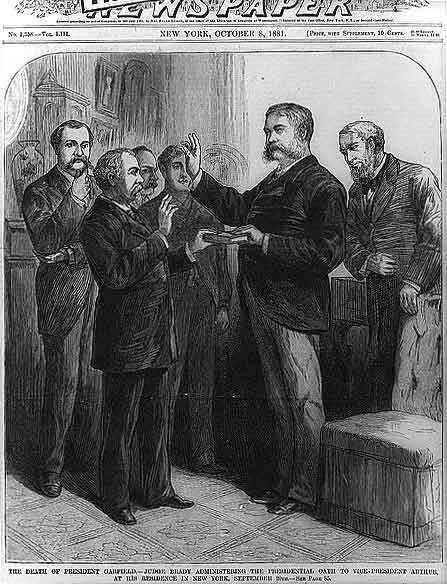
It was fitting that Arthur was surrounded by friends when he took the oath of office at his home in Manhattan at 2:15 AM on September 20, 1881. Arthur's beautiful wife, Nell, died of pneumonia in January 1880 and he was inconsolable for months, regretting for the rest of the life the fact that she never saw his election as Vice President or ascendancy to the Presidency. People who knew Arthur stated that he clearly never fully recovered from her death, and that as a "deeply emotional...romantic person," it was no surprise that he ordered that fresh flowers were placed before her portrait in the White House every day while he was President.
Chester Arthur had a lot of friends. That's what happens when you control as many patronage positions as Arthur controlled for as long as Arthur controlled them. But it wasn't just his political position that gained him friends. Arthur was a great storyteller, a man who loved to hunt and fish, kind, easy-going, charming, graceful, and smooth. During his life he was nicknamed "Elegant Arthur" and is considered one of the most stylish of Presidents. Photographs of Presidents from the 19th Century show us men no different than statues. They dressed the same, they looked the same, and when portrayed in the black and white photos of the time, we feel no differently when we see their pictures than when we see a slab of marble carved in their image. Arthur leaps out of his photographs, however. He was a very large man for his era, standing 6'2" and weighing around 220 pounds during his Presidency. Large muttonchops connected to a bushy mustache and his close-cropped, wavy brown hair seemed to pull back his forehead and place more emphasis on expressive black eyes that easily reflected his moods. While it seems that most Presidents of the 19th Century wore the same boring black suit and black tie like a uniform, Arthur's ties are patterned, his jewelry is visible, collars are crisp, handkerchiefs are folded creatively, and his lapels shine as if they were polished along with his shoes. We see photographs of Arthur in fashionable overcoats, a wide variety of hats, and he employed a personal valet who helped the President change clothes for every occasion and multiple times a day -- he was said to have over 80 pairs of pants.
Most apparent of all is that Arthur was a gentleman -- an interesting man with superb social skills and fastidious manners. Even as one of the top operatives in New York's Republican political machine of the corrupt 1870's, he was nicknamed the "Gentleman Boss." As President, he brought entertainment back to the White House -- something that had been missing on a large scale since before the Civil War twenty years earlier. One of his recent predecessors, Rutherford B. Hayes, was one of the few critics of this development, stating that there was "nothing like it before in the Executive Mansion -- liquor, snobbery, and worse." Arthur also redecorated the White House, hiring Louis Comfort Tiffany to help with the design. To help raise money for the redecoration, Arthur basically held a White House yard sale. On the lawn of the mansion, twenty-four wagons full of history (including a pair of Abraham Lincoln's pants that were left behind in a closet) were sold to citizens. To some, the items were priceless; to President Arthur, they were ugly and a man like Chester Arthur did not live in an ugly home. Several weeks after Garfield died, Arthur got his first look at his new home and quickly stated, "I will not live in a house like this." He didn't end up moving into the White House until three months into his Presidency.
•••
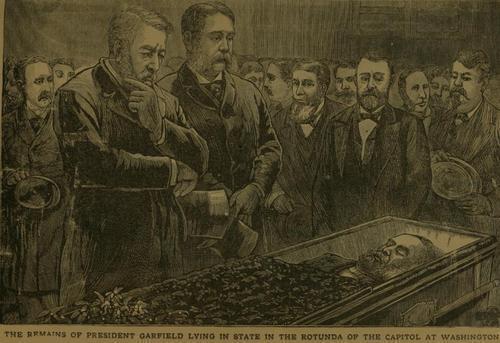
After taking the oath of office at home in Manhattan in the early hours of September 20, 1881, now-President Arthur proceeded to Washington, D.C., stopping in Long Branch, New Jersey to pay respects to the late President Garfield and his grieving family. Once Arthur succeeded to the Presidency upon Garfield's death, there was no Vice President, no president pro tempore of the Senate, and no Speaker of the House because Congress had not elected its leadership yet, thus, there was no Constitutional line of succession. If something had happened to Arthur at that moment, the United States would have faced an unprecedented Constitutional crisis. As his first act as President, Arthur immediately called the Senate into session in order to select their leadership positions and place someone in the line of succession. Upon arriving in Washington, Attorney General Wayne MacVeagh suggested that Arthur take a second oath of office and he did so at the U.S. Capitol on September 22nd in the presence of Garfield's Cabinet, members of Congress, Supreme Court Justices, and former Presidents Grant and Hayes.
Americans worried about the former machine politician's integrity were transformed quickly as Chester Arthur underwent somewhat of a transformation himself. Widely considered a lapdog of New York's Roscoe Conkling, Arthur broke ranks with the party boss and pushed for the same civil service reform championed by James Garfield prior to the assassination. Arthur's former associates in the New York Republican Party were disappointed when he declined their requests for political favors. One former colleague sadly reported, "He isn't 'Chet' Arthur anymore. He's the President." Arthur found that the transformation was almost automatic and out of his control, noting that "Since I came here I have learned that Chester A. Arthur is one man and the President of the United States is another." His old benefactor, Conkling, was one critic of the new President, complaining "I have but one annoyance with the Administration of President Arthur and that is, in contrast with it, the Administration of Hayes becomes respectable, if not heroic." Arthur signed the Pendleton Act in 1883 which created a modern civil service system and eliminated the spoils system that had long dominated American politics. The reform, which Conkling called "snivel service" was the final break between the longtime friends and colleagues.
To the American people, the great surprise of the Arthur Administration was the fact that it was clean, honest, and efficient. Arthur helped lift the gloomy moods that had shadowed Washington through the Civil War, Lincoln's assassination, Andrew Johnson's Impeachment, Reconstruction, the corruption of the Gilded Age, and Garfield's assassination. His popularity rose throughout his term and most critics focused on his lavish entertainment or the fact that he was notoriously late for meetings and seemed bored or lethargic at times. He often procrastinated -- as a White House clerk once said, "President Arthur never did today what he could put off until tomorrow." Still, most Americans were happy with President Arthur and echoed the thoughts of Mark Twain who said, "I am but one in 55 million; still, in the opinion of those one-fifty-five-millionth of the country's population, it would be hard to better President Arthur's Administration."
He was bored, though. President Arthur didn't like being President. He enjoyed the entertaining dinners that he could throw and loved public events or ceremonies that allowed him to meet the people of the United States, but the desk work was tedious and he wasn't interested in policy. Arthur stayed up late and seemed to vacation often, which perplexed many people because it was said that he was constantly exhausted. What they didn't know was that from almost the time he became President, Chester Arthur was dying. In 1882, he was diagnosed with Bright's disease, a fatal kidney ailment at the time. Despite reports that he was suffering from the disease, Arthur hid it from the public, desperately protecting his privacy, as always. Arthur's distaste for the Presidency probably stemmed in part from depression triggered by the Bright's disease. At times, Arthur suffered from debilitating illness and it was always covered with a story about the President catching a cold during a fishing trip or spending too much time in the sun while hunting. In a letter to his son Alan in 1883, the President confided, "I have been so ill that I have hardly been able to dispose of the...business before me."
Despite his popularity, Republican leaders opposed Arthur's nomination as President in his own right in 1884. The man who opposed it most, however, was the President himself, who stated "I do not want to be re-elected." Not only was he disinterested in a second term, but he knew very well that there was a possibility he might not even survive to the end of his current term. He did, and after attending the inauguration of his successor, Grover Cleveland, on March 4, 1885, Arthur returned home to New York City where his health rapidly declined. The former President was aware that he was dying and made plans for a relatively quiet retirement, deciding to practice law, but doing very little work due to his health. When asked about his future, Arthur said, "There doesn't seem anything for an ex-President to do but to go out in the country and raise big pumpkins." On November 16, 1886, Arthur suffered a stroke that paralyzed his left side. Gravely ill, he called his son to his bedside the day before his death and had all of his public and private papers stuffed into trash cans and burned. On November 18, 1886, the 57-year-old former President died in the same place he became President just five years earlier, 123 Lexington Avenue in New York City. After a quiet funeral at the Church of Heavenly Rest on Fifth Avenue in New York, Arthur's remains were buried next to his beloved wife at Rural Cemetery in Albany, New York.
•••
When President Arthur had many of his personal papers burned prior to his death, he eliminated one of the best sources of information for future historians. With a thin resume and a fairly uneventful Presidency, there wasn't much public information about his career, either. This leaves us with very little to remember Chester Alan Arthur by. Research on his life -- particularly his personal life -- is difficult, and Arthur would have appreciated that. During his Presidency, leaders of the temperance movement called on Arthur and urged him to follow the non-alcoholic lifestyle led by President Hayes and his teetotaler wife, who was known as "Lemonade Lucy."
Arthur's response: "Madam, I may be President of the United States, but my private life is nobody's damn business."
And so it isn't.
#History#Presidents#Chester Arthur#Chester A. Arthur#Chester Alan Arthur#President Arthur#Arthur Administration#Presidential History#The Elegant Mr. Arthur#James A. Garfield#President Garfield#Assassination of James Garfield#Garfield Assassination#Charles Guiteau#Inauguration of Chester Arthur#Presidential Assassinations#Presidential Succession#Roscoe Conkling#Gilded Age#Civil Service Reform#Pendleton Act#1880 Election#1884 Election#Politics#Political History#Gentleman Boss#Presidential Personalities#Presidency#Vice Presidents#Vice President Arthur
26 notes
·
View notes
Text
hehe
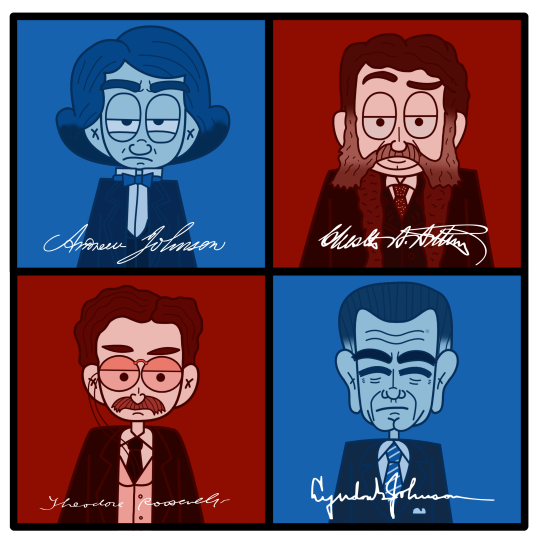
Did I mention I was a US History fan? Happy Presidents Day!
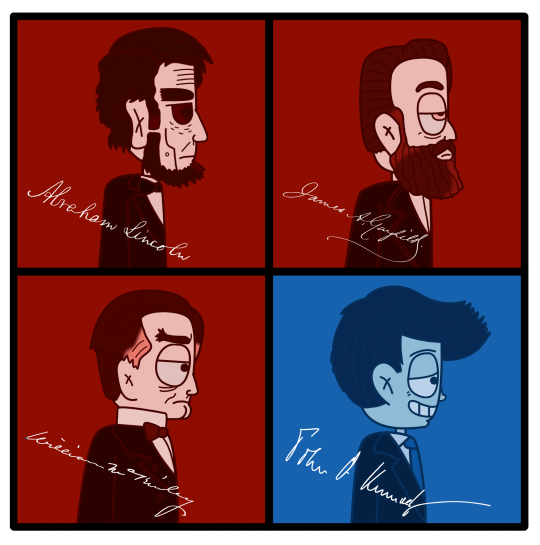
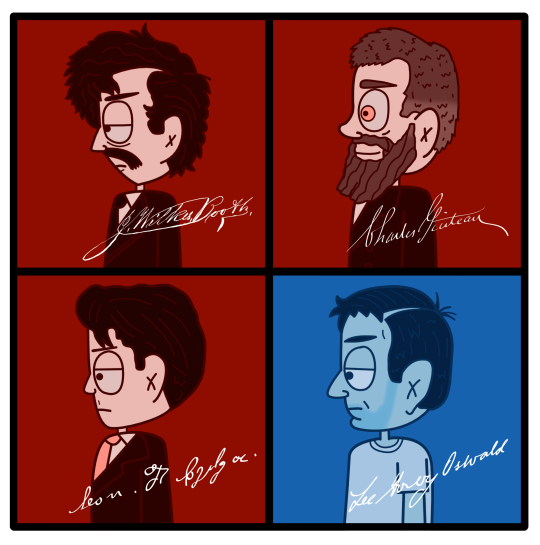
#my art#us history#us presidents#american president#american history#potus#andrew johnson#chester alan arthur#lyndon b. johnson#lbj#lyndon baines johnson#theodore roosevelt
33 notes
·
View notes
Text
Some say that Chester Alan Arthur, 21st president of the United States's middle name was once spelled Allan, but then Garfield took the L.
2 notes
·
View notes
Text
THE FACE IS FAMILIAR… BUT I CAN’T PLACE THE NAME!
Same Actor / Different Character ~ Part 3: “Here's Lucy"
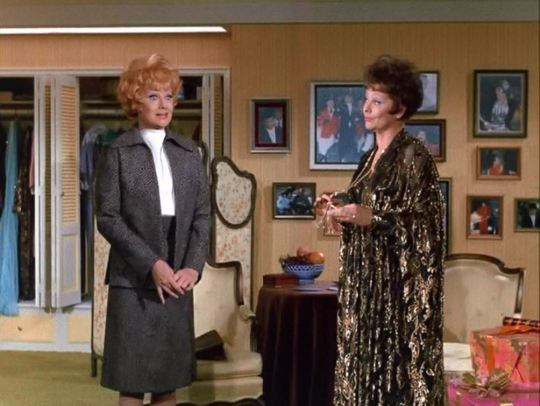
It used to be quite common for actors to be cast in multiple roles on the same series. Not in principal parts, certainly, but in supporting and minor characters. Lucycoms were no exception. Although the world created by these shows was representative of reality, the characters who populated them often gave viewers Deja vu. By the time "Here's Lucy" premiered in 1968, Lucille Ball had developed a repertory company of actors that she used time and time again.
For the purposes of this discussion, we won't include background performers (aka extras) as they were nearly always drawn from the same pool of actors. Also, those who played multiple characters need to have at least one of them identified by name.
MARY WICKES
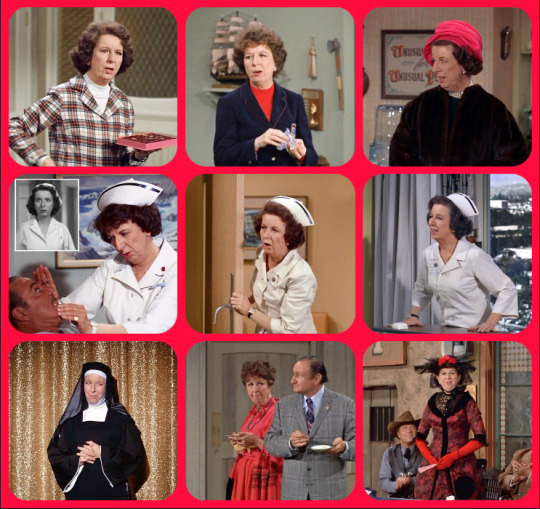
Lucille Ball's good friend tops the list of actors who played multiple roles, with seven characters in nine appearances. When the series premiered, she played a secretary friend of Lucy Carter's named Isabel in two episodes. Perhaps there was no room for Isabel, so she disappeared, but Wickes did not! Due to the fact that she played a nurse in her breakout role in The Man Who Came to Dinner (both stage and screen), she also played several nurses. She even showed up as Lucy's sister-in-law, a nun, another type that she was often cast as in films. In addition, she was a maid to an eccentric dowager, a Montana matriarch, and a nosy neighbor.
JACK COLLINS
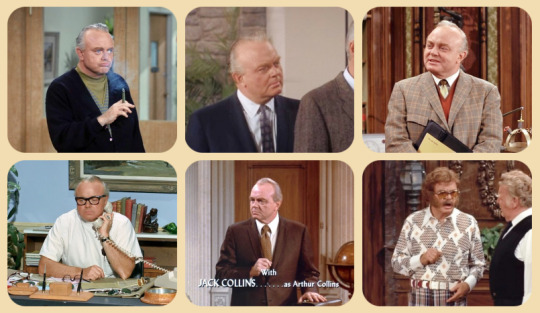
Collins' six appearances span from season one in 1968 to the series finale in 1974. He played secret agent Johnson, expectant father Mr. Phillips, Vincent Price's producer Curt, Harry's eye optometrist Dr. Proctor, Harry's accountant Arthur Collins, and Harvey Stevens, proprietor of Harvey's Welcome Inn. Perhaps Collins is best compared to versatile actor Charles Lane on "I Love Lucy"?
CAROLE COOK
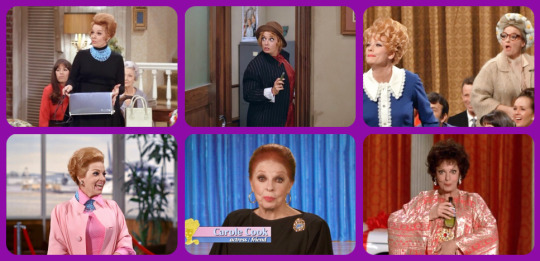
Lucy's protege is back with more interesting characters - five of them, to be exact. She started the series as a wacky woman in Carol Burnett's audience, played crusading neighbor Sheila Casten, bridge club member Lillian Rylander, gangster Ma Parker, and Cynthia Duncan, a Lucille Ball look-alike. Ma Parker was by far Cook's largest and most adventurous role on the series.
IRWIN CHARONE
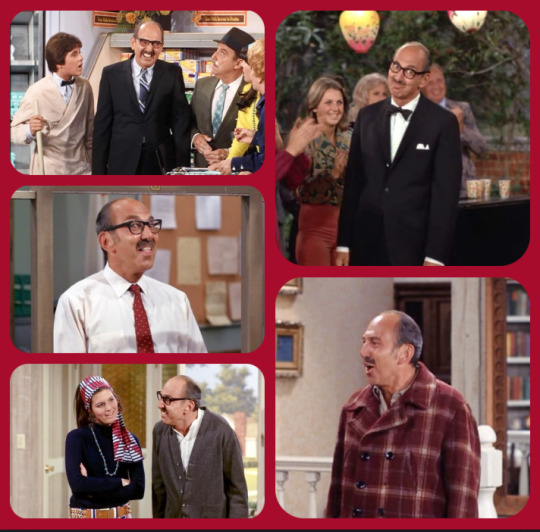
Charone made five appearances on “The Lucy Show” and an equal number of “Here’s Lucy” episodes. Mr. Garfield of the Nippy Whippy Whipped Cream Company , dog owner Mr. Farnsworth, neighbor Chester P. Franklin, a permit office clerk, and college dean Phillips.
ROY ROBERTS
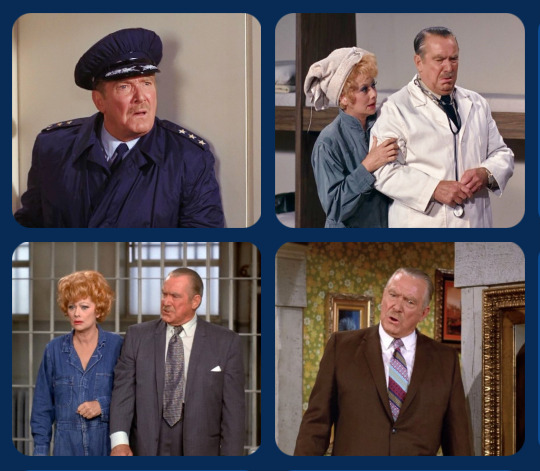
Roberts made an impact as Mr. Cheever on "The Lucy Show." His first appearance on "Here's Lucy" was as the Superintendent of the Air Force Academy in a two-part season opener filmed on location. He returned as a NASA's Dr. Jensen in "Lucy and the Astronauts" (1971), Warden Maginetti when "Lucy Goes To Prison" (1973), and Dr. Honeycutt when "Lucy is N.G. as an R.N." (1974).
RHODES REASON
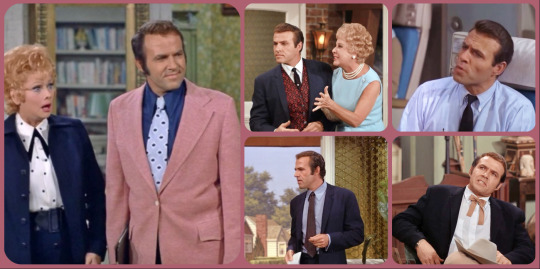
Reason was a handsome leading man type who easily played a variety of roles from 1968 to 1973: Bradley Henshaw, Jim Simpson, Sam Toliver, Lieutenant Egan, and Keith Davidson.
ROBERT CARSON
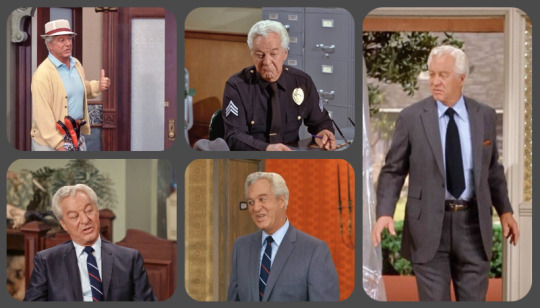
Carson was a busy Canadian-born actor. While he never played supporting roles, he wasn't just an extra either. On "Here's Lucy" he played Martin Philips, Buzzy Brock, Sergeant Lou Holmes, and Officer Hurlow.
ROBERT ALDA

Alda (father of Alan) was best known for originating the role of Sky Masterson on Broadway in Guys and Dolls (1950). He did four episodes of "Here's Lucy," the first as himself, hosting the Secretary Beautiful Contest. The role was originally written for Don Ameche, then re-cast with Ross Martin, before Alda was finally given the part. He got to use his musical theatre skills singing the pageant’s theme. He put his musical skills to use again as Dean Butler in "Lucy, the Co-Ed" (1970). He also sang as Captain MacClay in a two-parter set on a cruise ship to Hawaii.
WALLY COX

Cox had come to the nation's attention as Mr. Peepers. On "Here's Lucy" he played ex-con safecracker Rock Barnett, wimpy Wally Manley, diamond cutter Gustav Vandermeer, and toy tycoon Tommy Tucker.
DORIS SINGLETON
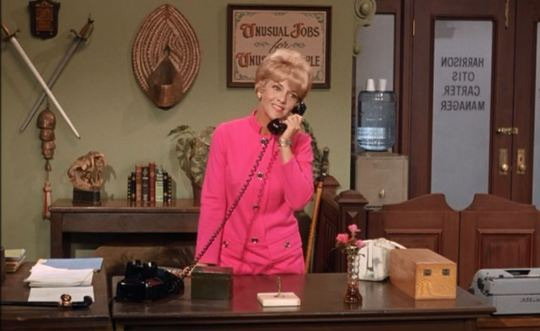
Singleton created the role of Caroline Appleby on “I Love Lucy.” She was slated to appear as Doris, a secretary colleague of Lucy's, on "Here's Lucy," but the role was eliminated after the first episode. She returned, however, for three more appearances, all as secretaries to the stars: Petula Clark's secretary Miss Perkins, Eddie Albert's secretary Patty, and Lucille Ball's secretary Doris, a role modeled after Ball's own secretary Wanda.
WILLIAM LANTEAU
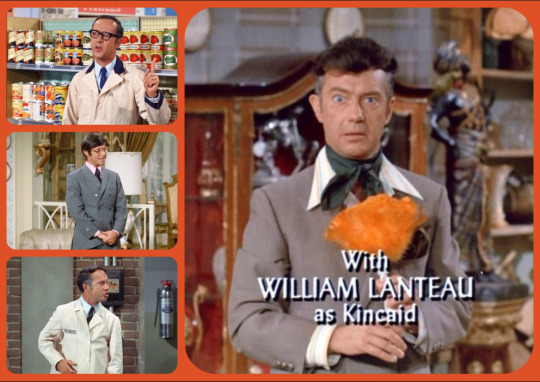
William Lanteau was a theatre actor who was most famous for playing Charlie the Mailman in On Golden Pond. His theatrical background surely helped him disguise himself in his four roles on "Here's Lucy". Unlike past guest actors, he looks significantly different in each one: Mr. Sherwood, a supermarket manager; Mr. Minkle, building superintendent; Spike, Ginger Rogers' secretary; and Edgar St. Vincent Kinkaid, antiques store manager.
DICK PATTERSON
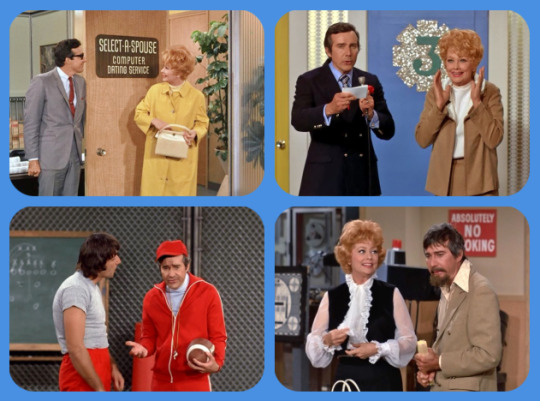
Patterson was seen by Lucille Ball performing on stage and cast on "The Lucy Show." He continued his relationship with the redhead on "Here's Lucy" where he played computer matchmaker Mr. Morton (Ball's real surname), TV host Dick Dunkirk, Joe Namath's football coach Hennessy, and director of Lucy's pickle commercial Steve Thompson.
RETA SHAW
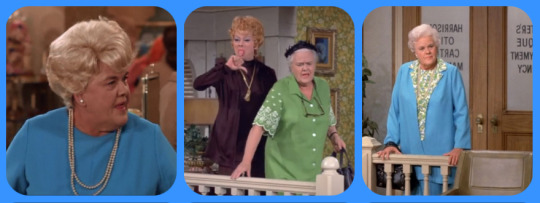
Shaw was a star of stage and screen (big and small) and Lucille Ball enjoyed working with her. This time, in the series' third episode, she played Mabel Ryker, using the same first name she had in The Pajama Game on stage and screen. She played Rita Forrester in "Lucy and The Group Encounter" (1972), and Mrs. Witherspoon, Lucy's prospective new boarder in "Lucy's Tenant" (1973).
LOLA FISHER
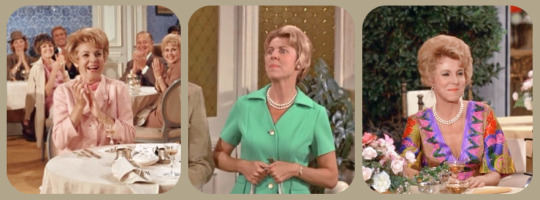
Fisher understudied and replaced Julie Andrews on Broadway in the musical My Fair Lady. She was seen as in "Lucy's Working Daughter" (1968), as Mrs. Pomeroy in "Lucy in the Jungle" (1971), and Bunny in "Lucy and the Franchise Fiasco" (1973).
CLIFF NORTON

Norton played Sam the Plumber who's overalls turn up on Richard Burton. He was an undercover detective looking for scalpers in an episode starring O.J. Simpson. Lastly, he got title billing in "Mary Jane's Boyfriend", playing accident prone Walter Butley.
BEN WRIGLEY
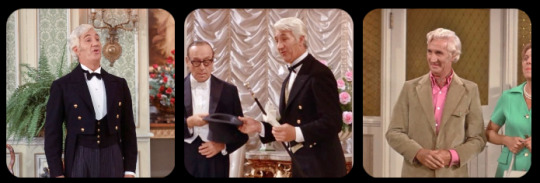
Wrigley was a British actor who appeared in My Fair Lady (1964) and Bednobs and Broomsticks (1971). so he was a natural to play butlers to Liberace and Jack Benny. He also played Homer Pomeroy in "Lucy in the Jungle" (1971).
BRUCE GORDON
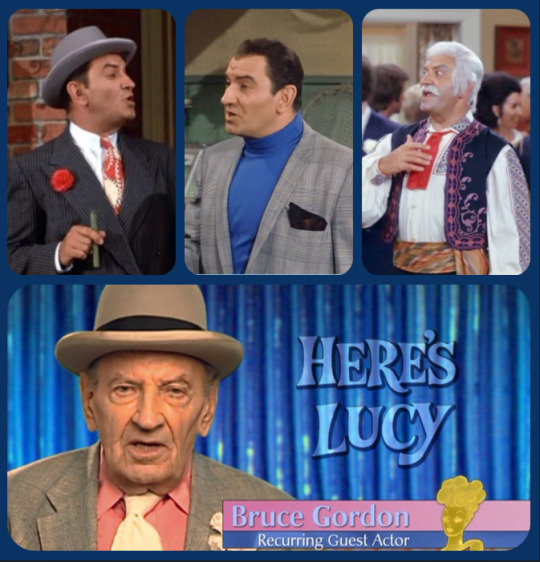
Gordon was best known for playing gangster Frank Nitti in the Desilu television series "The Untouchables" (1959-63), a role he satirized on "The Lucy Show". He trades on that reputation again as Doc Porter in "Lucy and the Ex-Con" and Rocky in "Dirty Gertie", another organized crime scenario. For a change of pace, he played Grandfather Konstantine Kasos in "Lucy's Wedding Party."
ELLIOTT REID
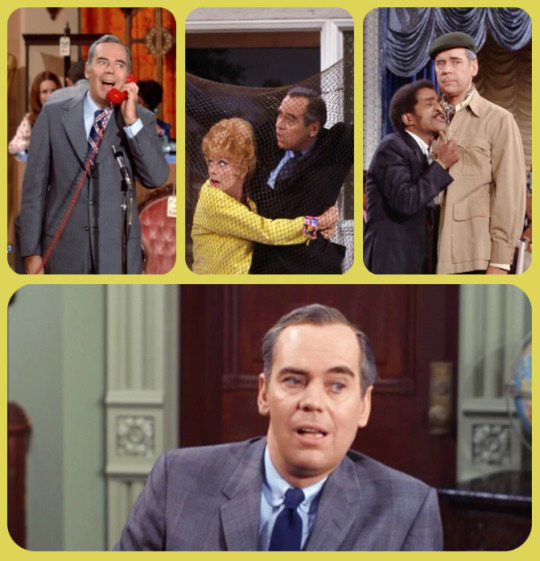
Reid's work with Lucy goes back to "I Love Lucy". Here he plays three roles: Detective Harvey Gaines, Sammy Davis Jr.'s Director, and the host of Milton Berle's telethon.
PHIL VANDERVOORT
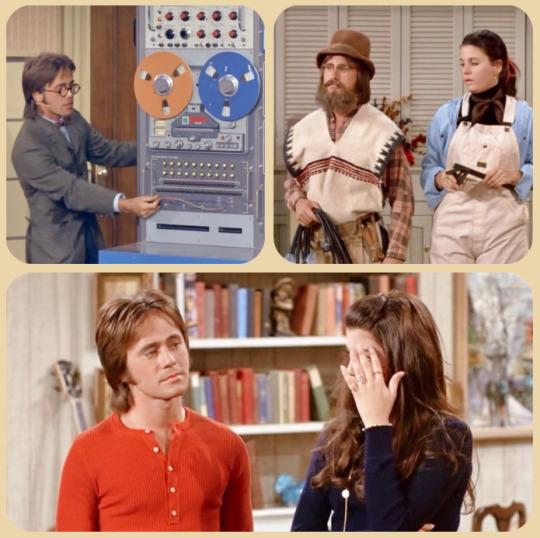
Vandervoort was (briefly) Lucille Ball's son-in-law and Lucy believed in keeping it in the family, casting her children, her husband, and her cousin-in-laws on the series. Vandervoort, a handsome young man, makes only three appearances but each one is made to look dramatically different, perhaps to obscure his leading man good looks. He plays Kim and Craig's musician friend Steve (the most 'normal' of his appearances), computer geek Joe Hackley, and beaded handman Tommy.
BARBARA MORRISON

Morrison returns to play two more imposing and imperious women: Harry's date Lady Agatha Warren, and finicky shopper Mrs. Murdock. With many other members of Lucy's acting company, she turns up as a diner in the series' penultimate episode.
HARRY HICKOX

Hickox was best known for playing anvil salesman Charlie Cowell in the 1962 film The Music Man. He played a drill sergeant on "The Lucy Show". He played three different policemen on “Here’s Lucy.”
BILLY SANDS
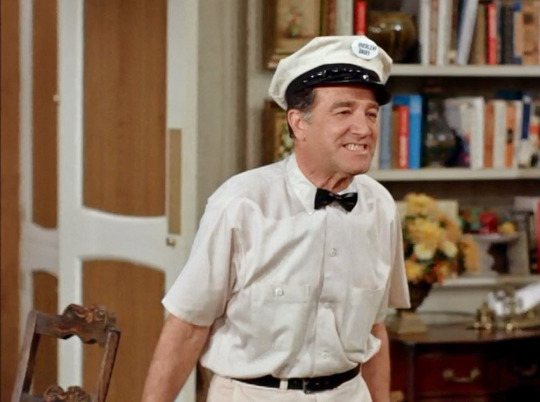
Sands played Mr. Larson, Lucy's milkman, in two episodes, but he also played Billy the bookie in a third appearance.
DON CRICHTON
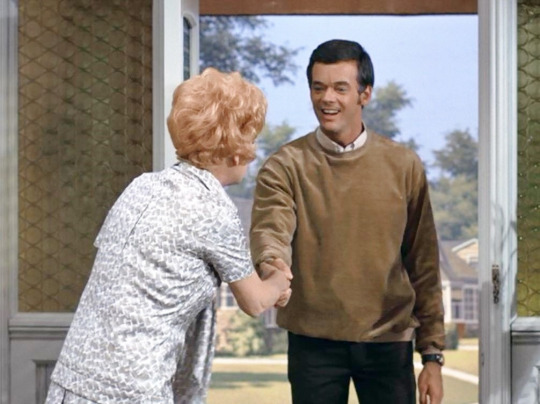
Crichton was a dancer on "The Carol Burnett Show" and also did small roles, just as he did on "Here's Lucy". He danced in the series premiere, and then acted, playing Don in "Lucy, The Conclusion Jumper" (1968), and Steve in "Lucy, The American Mother" (1970).
LEW PARKER
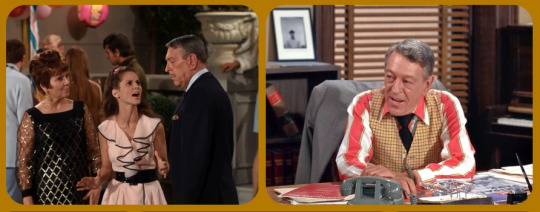
Parker, best known as Marlo Thomas' father on "That Girl", was seen on the very first episode of "Here's Lucy" in 1968 as Mr. Caldwell. He returned in 1971 as Mr. Adams, the manager of an All-Nun Band.
LYLE TALBOT
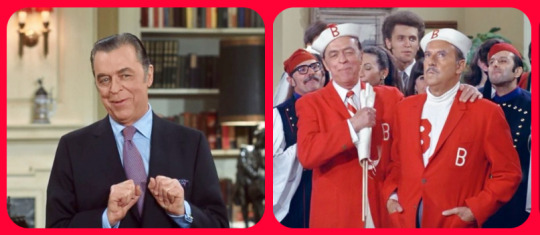
Talbot, a veteran film actor, played Harry's Lawyer and his best pal from Bullwinkle U, Freddy Fox.
JACK MANNING
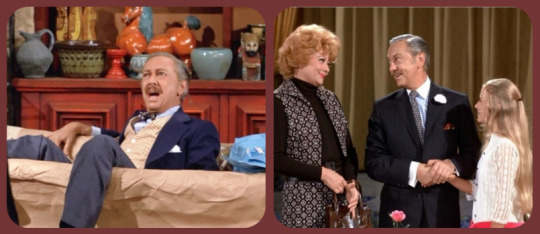
Manning played Mr. Walters, the manager of the showroom presenting teen idol Donny Osmond as well as Mr. Hubbell, a ceramics store owner who runs art classes, both during season 5.
RICHARD DEACON
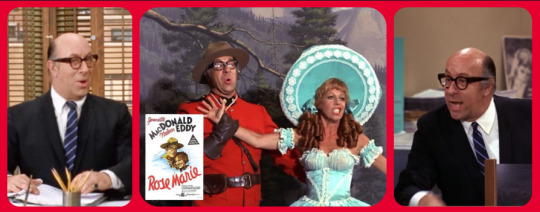
Deacon was one of Desilu's favorites, appearing on "The Lucy-Desi Comedy Hour," "The Mothers-In-Law" and "The Dick Van Dyke Show." For "Here's Lucy" he played unemployment office worker (with show biz aspirations) Harvey Hoople, and Loan Officer Elmer Zellerbach.
ALAN OPPENHEIMER
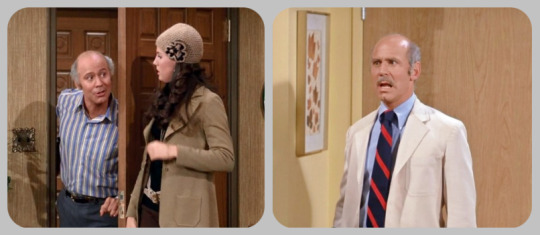
Oppenheimer played the part of the previously unknown Uncle Herb Hinkley, Lucy's brother. He then turned up as Lucy's doctor, Dr. Matt Parker.
OTHERS WHO 'HIT A DOUBLE'
Robert L. Stevens (River Guide / Alan Stevens)
James Brodhead (Tilford / Mr. Miller)
Mike Howden (Ski Instructor / Flight Attendant)
Ivor Barry (Producer / French Chef)
Hal Dunlop (Major Dunlop / Mr. Greenway)
R.G. Brown (Office Manager / Walter, Eva Gabor's Assistant)
Ernest Sarracino (Mr. Nicoletti / Tony)
Cecil Gold (Fred / Cecil)
Jimmy Bates (Clarence / Billy Joe Jackson)
Robert Hogan (Captain Perry / Jack Lucas)
Johnny Silver (Mountie / Benny)
Jody Gilbert (King Kong Woman / Prison Matron)
Ed Hall (Officer Egan / Numbers Smith)
Marc Lawrence (Joe Grapefruit / Ruby)
Florence Lake (Little Old Lady / Trixie)
Eddie Quillan (Cabbie / Mr. Jackson)
Al Checco (Detective Bobby / Dr. Crawford)
Dick Winslow (Harvey / Nightclub Emcee)
Susan Tolsky (Sue Ann Ditbenner / Miss Quigley)
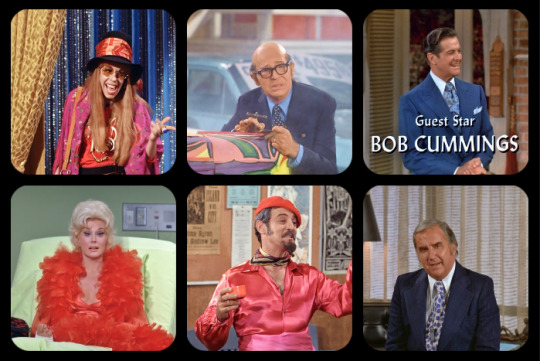
CELEBRITIES WHO DID 'DOUBLE DUTY'
CAROL BURNETT (Carol Krausmeyer / Herself)
MILTON BERLE (Cheerful Charlie / Himself)
ROBERT CUMMINGS (Bob Collins / Bob Henning)
EVA GABOR (Eva Von Graunitz / Herself)
PAUL WINCHELL (Carlo the Tailer / Little Old Jeweler & The Great Pierre Barmarche)
ED MCMAHON (Ed McAllister / Himself)
LUCILLE BALL (Lucy Carter / Herself)
#Carole Cook#Jack Collins#Here's Lucy#Lucille Ball#TV#CBS#sitcom#Actors#Mary Wickes#Rhodes Reason#Roy Roberts#Irwin Charone#Doris Singleton#Wally Cox#Robert Carson#Robert Alda#William Lanteau#Dick Patterson#Lola Fisher#Reta Shaw#Carol Burnett#Cliff Norton#Ben Wrigley#Bruce Gordon#Phil Vandervoort#Elliott Reid#Lucie Arnaz#Barbara Morrison#Harry Hickox#Ed McMahon
2 notes
·
View notes
Text
Ababan Abhinav Abhishek Abigàl Abrahan Absalon Abundí Acevedon Acostan Adalberton Adam Adamon Adams Adan Adarsh Adelan Adelası Adelen Adelhèd Adelmon Adelàdan Adelı Adesh Adin Adisodan Adkins Adolf Adolfon Adrìnnen Adrın Adrınan Adrınon African Agapiton Agathan Agnes Agnolon Agnès Agostinon Agustinan Agùlar Agùrren Agūdan Ajish Ajit Ajä Akhil Akhilan Alan Alban Albanon Albericon Albert Albertan Alberton Albin Albinan Aldon Alejandran Alejandron Alessandran Alessandron Alessı Alex Alexander Alexandran Alexandren Alexis Alfonson Alford Alfred Alfredon Alicen Alicı Alin Alinan Alinen Alison Allan Allen Allison Alman Almudenan Almut Alodı Alondran Alphons Alston Altagracı Alvan Alvaradon Alvaran Alvarez Alvaron Alvin Alwin Alyssan Alàn Alœs Amadé Amalı Amandan Amandinen Amber Ambican Amedé Amelı Amin Amit Amitan Ammar Amparon Amritan Amyn Amäan Amélì Anan Ananyan Anderson Andren Andres Andrew Andrews André Andréen Andrĕ Andrĕs Andyn Angel Angelan Angeles Angelican Angelikan Angelinan Angelon Angéliqū Angì Anibal Aniceton Anil Anirban Aniruddhan Anitan Anjalin Ankit Ankitan Ann Annalisan Annalìsen Annan Annelisen Annelìsen Annemarì Annen Annettan Annetten Annick Annì Ansgar Anteron Anthonyn Anton Antonìtan Antonìttan Antoní Antonı Antœnen Antœnetten Anuj Anun Anup Anupam Anupaman Anurag Anushrē April Apōrvan Aracelin Arantxan Arindam Arjun Arlenen Arletten Arlon Armandon Armin Armstrong Arndt Arnold Arnâd Aron Arpitan Arsení Arthur Artin Arturon Arun Arunachalam Arundhatin Arvid Arvind Aryaman Aryan Arìl Ascensín Ashlë Ashokan Ashvin Ashwin Astrid Asuncín Asēm Atkins Atkinson Averyn Avilan Axel Azucenan
Baker Baldassaren Baldwin Balin Ball Ballabh Ballard Banks Baptisten Barbaran Barber Barker Barlow Barnes Barnett Barr Barreran Barrett Barron Barryn Bartlett Bartolomen Bartolomé Barton Basilí Bass Bastın Bates Battlen Baxter Beck Becker Beckyn Begonan Belen Belindan Bell Beltran Ben Bender Benedetton Benedikt Beneharon Benitan Beniton Benjamin Bennett Benoît Benson Bentlë Benton Benvenuton Beppen Berenicen Berg Berger Bernadetten Bernard Bernardinon Bernardon Bernd Bernicen Berryn Bertan Berthan Bertram Bertrand Bessì Best Beth Bethanyn Betsyn Bettinan Bettyn Beverlyn Bharat Bhardwaj Bhavesh Bhupinder Bhushan Bibin Bijun Bill Billyn Billì Binod Binun Bipashan Bird Bishop Black Blackburn Blackwell Blaken Blancan Blanchard Blanchen Blankenship Blas Blevins Blàr Bob Bobbyn Bobbì Bodon Bolton Bond Bonifací Bonner Bonnì Bowen Bowers Bowman Brad Bradford Bradlë Bradshaw Bradyn Branch Brandin Brandon Brandyn Brendan Brennan Brent Brett Brewer Bridges Bridget Briggs Bright Brigitten Britt Brittanyn Brock Brown Browning Brucen Brunildan Brunon Bryan Bryant Brâlí Brä Brın Brōken Brōks Buchanan Buck Bucklë Buckner Bullock Burch Burgess Burken Burks Burnett Burns Burris Burt Burton Bush Butler Byers Byrd Byron Bàlë Bàrd Bâer Béatricen Bêlah Bód Bóer Bólen Bĕch Bĕn Bĕrd Bĕslë Bĕt Bĕtan Bĕtricen Bĕtriz Bıncamarı Bıncan Bınkan Bōker Bōnen Bōth
Cabreran Calderon Caldwell Calhòn Calixton Callahan Calvin Camachon Cameron Camilan Camillan Camillen Camillon Campbell Campos Candacen Candicen Candidan Candidon Cannon Cantrell Cantun Canuton Cardenas Caridad Carl Carlan Carlos Carlotan Carlson Carmelon Carmen Carminen Carnë Carol Carolen Carolinan Carolinen Carolyn Carpenter Carr Carrillon Carroll Carrì Carson Carter Carver Carë Casen Cash Casimiron Casper Cassandran Castanedan Castillon Castron Casë Catalinan Caterinan Catherinen Cathyn Catrinan Cecelı Cecil Cecilı Celinen Celı Cervantes Cesar Cesaren Chad Chambers Chan Chandler Chandrajit Chang Chantal Chanë Chapman Charlenen Charles Charlotten Charlì Chasen Chavez Chaxiraxin Chelsĕ Cheman Chen Cherryn Cheryl Chester Chloé Chris Christan Christel Christellen Christensen Christinan Christinen Christof Christophen Christopher Christyn Christì Christın Christınen Church Chıran Cindyn Citlalin Claran Clarencen Clark Clarken Clelı Clements Clemons Cleveland Clifford Clifton Clinen Clinton Clotilden Clyden Clàren Clâden Clâdinen Clâdí Clâdı Clä Cläton Clémencen Clément Cobb Coburan Cochran Codyn Coffë Cohen Colbyn Coleman Colen Coletten Colin Collins Collìr Collēn Colon Colton Combs Compton Concepcín Conlë Conner Connì Conrad Consolacín Constancen Constantinon Consūlon Contreras Conwä Copeland Coralì Coran Corinan Corinnen Cornelí Cornelı Corradon Cortez Coryn Corë Cosimon Costanzon Coten Cotton Covadongan Cox Craft Cranen Crawford Cristinan Cristobal Crosbyn Cross Cruz Crystal Cràg Cummings Cunningham Curryn Curtis Cynthı Cyril Càn Cäetanon Cécilen Cédric Célinen Còrtnë Cōk Cōken Cōlë Cōper
Dagmar Dagobert Dalen Dalilan Dalton Damason Damäantin Damìn Damın Damınon Dan Danan Danilon Danièlen Dannyn Danten Danìl Danìlan Danìlen Danìllen Danìls Daritzan Darlan Darlenen Darrell Darren Darryl Daryl Darí Darı Daven Davenport David Daviden Davidson Davis Dawn Dawson Debbì Deborah Deboran Debran Decker Dejesus Delacruz Delanë Delfinon Delgadon Dellan Delores Delphinen Delén Delı Denis Denisen Dennis Derek Derqū Derrick Desamparados Desirē Devanshin Devendran Devesh Dhanishkan Dickerson Dickson Didìr Dillard Dillon Dinan Dinesh Dinon Dipankar Dixon Dixì Dodson Dolores Domenicon Domingan Domingon Domingūz Dominiqū Don Donald Donaldson Donatellan Donnan Donovan Doran Doris Dorothyn Dorotĕ Dorsë Dorēn Dotson Downs Draken Dudlë Duffyn Duken Duncan Dunlap Dunn Duran Duranten Durham Dustin Dwight Dwänen Dyer Dylan Dàsyn D��ghertyn Dä Däanan Dìdrich Dìgon Dìter Dìterich Dìtrich Dínisí Dínisı Dòglas Dólen Dünen Dēpak Dēpalin Dēpan Dēpikan Dēptin Dĕn Dĕnnan Dınan Dınen Dınnan Dınnen Dız
Ebban Ebben Ebonyn Echedë Eddì Edgar Edgardon Edith Edmund Edmundon Ednan Edvin Edward Edwards Edwin Edördon Edürdon Efren Egidí Ekkehard Ekram Elenan Elfrìden Elin Elinan Elis Elisan Elisen Elisé Elizabeth Elken Ellan Ellen Ellinor Ellis Ellison Ellì Ellít Ellítt Elmar Elmer Elmon Elsan Elsì Elton Elvin Elviran Elànen Eló Elĕnor Elınan Elıs Elœsen Emanūl Emeldan Emelì Emerson Emil Emilyn Emilì Emilí Emilı Emilınan Emman Emmanūl Emmanūllen Emmerich Emmyn Encarnacín England English Enkan Enní Enricon Enriqū Enriqūtan Enzon Eraldon Erhard Eric Erican Erickson Erik Erikan Erin Erman Ermenegildon Ernest Ernestinan Ernestinen Erneston Esperanzan Espinozan Essì Estanislá Esteban Estefanı Estelan Estellen Ester Estes Esther Estradan Ethel Ettoren Evan Evans Evelyn Everett Ewald Ewing Ezequìl
Fabricen Fabricí Fabricı Fabrizí Fabìn Fabìnnen Fabí Fabı Fabın Fabınan Facundan Facundon Fadriqū Fannyn Fannì Farlë Farmer Farrell Federicon Federigon Felicidad Felicı Felicınan Felicınon Felipan Felipen Felisan Felix Ferdinand Ferdinandon Ferguson Fermin Ferminan Fernan Fernandan Fernandez Fernandon Ferrandon Ferrell Fidel Figūrö Filip Filippan Filippon Filomenan Finch Finlë Firjas Fischer Fisher Fitzgerald Fitzpatrick Flaví Flavı Fleming Fletcher Floran Florencen Florencı Florent Flores Floron Florí Florı Florın Flowers Flynn Flód Folë Forbes Ford Foreman Foster Fowler Fox Frances Francescan Francescon Francinen Francis Franciscon Franck Francon Frank Franklin Franks Franz Françœs Françœsen Frazìr Fred Fredan Freddì Frederick Fredon Fredrik Frejan French Fridan Fritz Frost Fryen Fryn Frâken Frédéric Frìdemann Frìdrich Frēman Frœlan Frœlanan Fulbertan Fulberton Fulcan Fulcon Fuller Fulton Fulví Fàth Fâlkner Fâston Fäen Fìlds Fírinon Fımman Fūntes
Gabrìl Gabrìlan Gabrìlen Gabrìllan Gallagher Gallegos Gallowä Gamblen Ganesh Garan Garcı Gardner Garner Garrett Garrison Garyn Garzan Gasparen Gastonen Gates Gaétan Gaëllen Gebhard Geman Gemman Genaron Genen Genevan Genevièven Genevìven Gentryn Geppetton Gerald Geraldinen Gerard Gerd Gerhardt German Germar Germànen Gernot Gershun Gert Gertruden Ghislànen Gibbs Gibson Gilbert Gilberton Giles Gill Gilles Gillespì Gillım Gilmoren Ginan Ginebran Gines Ginetten Ginger Ginon Girish Girjesh Girolamon Giselan Giselher Gisèlen Gitan Gitanjalin Gladys Glass Glen Glendan Glenn Glorı Glover Goff Golden Gomez Gonzales Gonzalez Gonzalon Gopinathan Gordon Gottfrìd Gottlìb Gottschalk Gracen Gracìlan Graham Grant Graves Grazınon Greg Gregoryn Gregorí Gretan Gretchen Gretel Greten Griffin Griffith Grimes Griseldan Gross Grä Grégoryn Grēn Grēnen Grēr Guglìlmon Gunther Gurcharan Gurunath Gustav Gustavon Guthrì Gutìrrez Guzman Gwen Gwendolyn Gàl Gànes Gä Gäatrin Gälen Gætanon Gérard Gérg Gérgen Gérges Gérgetten Gérgı Gírgí Gírgı Gívannan Gívannin Gòld Götz Gùdon Gùllerminan Gùllermon Gùllâmen Gú Güdalupen Günther Gürinon Gīlìttan Gīlí Gīlı Gīlınan Gīlınon Gīseppen Gīseppinan Gıcinton Gıcobben Gıcomon Gıdan Gımpálon Gımpìron Gın Gıncarlon Gınfrancescon Gınfrancon Gınlucan Gınlùgin Gınmarcon Gınnan Gınnin Gınpálon Gınpìtron Gōd Gōdman Gōdwin Gūrran Gūrreron
Hahn Halen Hall Halë Hamilton Hammond Hampton Hampus Hanagü Hancock Hannah Hannan Hanneloren Hannen Hans Hansen Hanson Hansraj Hanë Harald Haran Hardik Hardin Harding Hardyn Harish Harjit Harmon Harold Harper Harrell Harrington Harris Harrison Harryn Harrìt Harsh Harshitan Hart Hartman Harvë Hatfìld Hattì Hawkins Hazel Hebert Hector Heddan Hedyn Helen Helenan Helgan Helgen Hellmuth Helmut Helmuth Hemalatan Henderson Hendricks Hendrix Henrin Henryn Henrìttan Henrìtten Henslë Henson Herbert Herman Hermann Herminen Hernandez Hernandon Herreran Herring Hervé Herwig Hess Hester Hewitt Hickman Hicks Higgins Hildan Hildegard Hilden Hill Hilman Hines Hinton Hipoliton Hitesh Hjalmar Hobbs Hodgen Hodges Hoffman Hogan Holcomb Holden Holder Holger Holland Hollowä Hollyn Holman Holmes Holt Hopen Hopkins Hopper Horn Hornen Horst Hortensı Horton Howard Howell Howen Hubbard Huber Hubert Hudson Huff Huffman Hugh Hughes Hugon Hugūtten Hull Humberton Humphrë Hunt Hunter Hurlë Hurst Hutchinson Hyden Häden Hädē Häes Hänes Häs Hèdemarì Hèdin Hèner Hènin Hènon Hènrich Hènz Hélènen Hòsen Hòston Hĕd Hĕth Hĕther Hōd Hōper Hōver
Idan Ignací Ildan Ilonan Imeldan Inakin Indiran Indranil Indranin Indumatin Ines Inez Ingon Ingram Ingrid Inigon Inmaculadan Inès Iran Irenen Irené Iris Irman Irwin Irènen Isabel Isabellan Isabellen Isak Isan Ishanan Isidoron Isidron Ismæl Isāc Itahisan Ivan Ivar Ivon
Jacintan Jacinton Jack Jackson Jackì Jacob Jacobon Jacobs Jacobson Jacopon Jacqūlinen Jacqūlyn Jacqūs Jagannath Jalaj James Jamì Jan Janan Janen Janet Janicen Janinen Janis Janì Jaran Jared Jarvis Jasminen Jason Javìr Javìran Jeff Jefferson Jefferyn Jeffrë Jenkins Jennan Jennifer Jennings Jennyn Jennì Jensen Jeremyn Jermànen Jeromen Jerryn Jesminder Jessen Jessican Jessì Jesus Jill Jim Jimenan Jimenez Jimmyn Jimmì Jitendran Jocelynen Jodin Jodyn Joel Joen Johann Johannan Johannes John Johnnyn Johnnì Johns Johnson Johnston Jolinen Jon Jonas Jonathan Jones Jonä Jordan Jorgelinan Jorgen Josef Josefan Josefinan Josen Joseph Josephinen Josetten Joshü Jost José Josū Joël Joëllen Judith Judyn Juhin Julì Julìn Julìtan Julìtten Julí Julı Julın Julınan Junen Junin Jupp Justicen Justin Justinen Juston Juttan Jàmen Jàpal Jàron Jä Jäant Jäashankar Jérômen Jó Jócen Jóner Jöchim Jön Jönn Jönnan Jönnen Jöqùn Jöqùnan Jörg Jün Jünan Jüncan Jünfran Jünitan Jünon Jürez Jürgen Jĕn Jĕnclâden Jĕnetten Jĕnfrançœs Jĕnluc Jĕnlòis Jĕnmarc Jĕnmarì Jĕnmichel Jĕnnen Jĕnnetten Jĕnninen Jĕnnì Jĕnpâl Jĕnpìrren
Kalimuthun Kamalan Kanen Kanikan Karan Karen Karin Karinan Karinen Karl Karlan Karlhènz Karsten Karthik Karthikan Karthikëan Katen Katherinen Kathlēn Kathryn Kathyn Katjan Katrin Katrinan Katyan Katì Kavitan Kazin Kebehin Keller Kellin Kellyn Kellë Kellì Kemp Ken Kendran Kennedyn Kenneth Kent Kerr Kerryn Kerstin Kevin Kidd Kim Kimberlyn King Kinnë Kirbyn Kirk Kirkland Kirtan Kishor Klaran Klinen Klâs Klâs-peter Klèn Knapp Knight Knowles Knox Koch Konrad Kramer Kripesh Krishnan Krishnappan Krishnäyan Kristan Kristen Kristin Kristinan Kristinen Kristyn Kristì Krystal Kumar Kumudinin Kurt Kylen Kàlash Kâfman Kâshal Kä Kälan Kèth Kë
Ladislá Ladislâs Lakshan Lakshanyan Lakshman Lamb Lambert Lamberton Lanan Lancaster Lancen Landon Landryn Lanen Lang Langlë Laran Larryn Lars Larsen Larson Latan Lathan Latóan Lavernen Lawrencen Lawson Leblanc Lelan Len Lenan Leró Leslì Lester Leticı Levin Levinen Levyn Lewis Liberton Licı Lidı Lilan Lillan Lillyn Lillì Lillın Lilı Lilınan Lilınen Linan Lindan Lindsä Lindsë Linn Linnĕ Linus Lisan Lisbeth Littlen Liv Livingston Liví Livı Llód Logan Loken Lolan Long Lonnì Lopen Lopez Loran Lorenan Lorenen Lorentz Lorenzan Lorenzon Lorettan Lorin Lorrànen Lothar Lott Lovan Loven Lovis Lovisan Lowen Loweryn Loïc Luc Lucan Lucas Luchinon Lucillen Lucrezı Lucyn Lucì Lucìn Lucìnnen Lucí Lucı Lucınan Lucınon Ludovic Ludovican Ludovicon Ludvig Ludwig Lukas Lulan Lunan Lutz Luz Lydì Lydı Lykken Lynch Lyndan Lynetten Lynn Lynnen Lyons Lâran Lâren Lârencen Lârent Lârettan Lârì Lârĕnon Lætitı Lèan Lègh Lèlan Lèren Lé Léan Lén Lénan Lénard Lénardon Lénen Lénor Lépoldon Lìsl Línel Lòellan Lòin Lòis Lòisen Lòrdes Lùgin Lùs Lùsan Lütold Lē Lēlan Lēlavathin Lĕ Lĕch Lĕh Lĕndron Lı Lım Lınan Lœs
Mabel Mablen Macarenan Macdonald Mack Macıs Madden Maddox Madelinen Madelènen Madhurin Magalin Magdalenan Maggì Mahbōb Mahendran Majan Majken Maldonadon Mallikan Malonen Malten Malvinan Mamì Mandar Mandyn Manish Manjulan Manmohan Mann Manning Manon Manoraman Manūl Manūlan Marc Marcel Marcelan Marcelinan Marcelinon Marcellan Marcellen Marcellon Marcelon Marcon Marcos Marcus Marcı Marcıl Margaret Margareten Margaritan Margì Margūriten Maribel Marilyn Marinan Marinen Marisan Marissan Marjorì Mark Marks Marlenen Marqūz Marsh Marshall Marshan Martan Marthan Martin Martinan Martinen Martinez Martinon Marvin Maryann Maryn Marì Marìchristinen Marìclâden Marìllan Marìthérèsen Marí Marín Marīs Marı Marın Marınan Marınnen Marınon Mason Massimilınon Massimon Massë Mathew Mathews Mathilden Mathis Mathiê Matildan Matilden Matthew Matthews Matthiê Matthıs Matté Mattì Maté Matıs Max Maximen Maximilın Maximon Maxinen Maxwell McBriden McCall McCarthyn McCartyn McCluren McClàn McConnell McCormick McCrä McCullògh McCó McDanìl McDonald McDowell McFadden McFarland McGowan McGùren McGē McIntosh McIntyren McKenzì McKinnë McKnight McKä McKē McLâghlin McLéd McLĕn McMahon McMillan McNèl McPherson Medard Medinan Megan Meghan Mejan Mejı Melanì Melanı Melban Melendez Melinan Melindan Melissan Melker Melodyn Melton Melvin Mendez Mendozan Mercadon Mercedes Mercer Meredith Merrill Merritt Michaël Michel Michelan Michelangelon Michelen Micheletton Michelinen Michellen Michelotton Michæl Michælan Michèlen Michĕl Mickaël Micælan Middleton Migūl Migūlan Miken Milagros Mildred Milenan Miles Miller Mills Milon Milton Mindyn Minnan Minnì Miran Mirandan Mircon Mirellan Mirkon Mirèan Mirèllen Mirëan Mirım Mistyn Mitchell Modestan Modeston Mohamed Molinan Mollyn Monan Monican Monikan Moniqū Monroen Montgomeryn Montserrat Montóan Morales Moran Morenan Morenon Morgan Morganen Morin Moritz Morris Morrison Morrow Morsen Morton Moses Moslë Moss Mukesh Mullen Mullins Munish Munoz Murillon Murphyn Murrä Murìl Muthuswamyn Myers Myn Myran Myrtlen Myrım Màten Mâran Mâricen Mârilí Mârizí Mâron Mârēn Mä Mäan Mäank Mäer Mänard Mäon Märtan Mäs Mäten Mæ Mènrad Mélanì Mélissan Mëer Mëers Mí Mö Mĕdows Mĕgens Mōdyn Mōn Mōnë Mōren Mœses Mūller
Nadinen Nadēm Nadı Nagaraj Nagesh Nahlan Nalinin Nanan Nancyn Nannen Napolénen Naranbhà Narcisan Narcison Naräan Nash Natalì Natalí Natalı Natan Natashan Nathalì Nathan Nathanìl Natividad Navarron Navin Navēn Nehal Nehan Nellì Nelson Nerin Nerĕ Nettì Newman Newton Ngúen Nibaran Niccolò Nicholas Nicholen Nichols Nicholson Nicolan Nicolas Nicolen Nicolettan Nicolâ Nicolâs Nicolò Nihal Nihar Niharikan Nikitan Nikolan Nildan Nils Ninan Ninon Nirav Nitesh Nitin Nivaldon Nixon Noblen Noel Noelı Noemin Nolan Noran Norman Norris Norton Novalì Novan Noémì Nripendran Nunez Nunzí Nurı Nàlan Námin Nèl Né Nìlsen Nìves Nöh Nēraj Nĕl
Obrìn Ochö Oconnor Océanen Odetten Odilen Odom Odonnell Ofelı Olaf Olgan Oliven Oliver Olivìr Olivı Ollen Ollì Olsen Olson Omeron Onofrí Onèl Onèll Onĕl Opal Oran Orazí Ordonon Oresten Orlandon Ornellan Orr Ortegan Ortiz Ortrud Oríl Osborn Osbornen Oscar Osvaldon Oswaldon Othmar Ottaví Ottomar Otton Owen Owens
Pabliton Pablon Pacen Pachecon Padillan Padmavatin Pagen Palanivel Pallav Palmer Paloman Pam Pamelan Panfilon Pankaj Paqù Parag Park Parker Parks Parrish Parsons Parul Parvatin Pascal Pascalen Pascül Pascülan Pasqül Pasqülen Pat Patel Paten Patricen Patrick Patricí Patricı Patsyn Patterson Pattin Patton Pattyn Paz Peck Pedron Peggyn Pellegrinon Peläon Penan Pennington Pennyn Perez Perkins Perryn Peter Peters Petersen Peterson Pettyn Phanin Phanitan Phelps Philip Philipp Philippan Philippen Phillip Phillips Phyllis Pickett Pilar Pittman Pitts Pollard Pompé Popen Porter Potter Potts Powell Powers Prajesh Prakash Pramod Pranab Pratibhan Pratt Pratul Preston Pricen Princen Priscillan Priyan Priyankan Prùtt Prētin Puccí Puckett Pugh Pujan Purificacín Pálan Pálon Pâl Pâlan Pâletten Pâlinan Pâlinen Pâliton Pänen Pìdad Pìrangelon Pìrcen Pìrgírgí Pìrgīseppen Pìrlùgin Pìrmarı Pìrren Pìrretten Pìrsantin Pìtron Pí Pĕrl Pĕrson Pōlen Pōnam
Qùnn Qūntin
Rachel Rachæl Radhanath Raffællan Raffællon Rafæl Rafælan Raginin Rahul Raj Rajan Rajendran Rajesh Rajinder Rajiv Rakesh Ralph Ram Ramakant Ramesh Ramiran Ramirez Ramiron Ramon Ramonan Ramos Ramsë Ramyan Ranan Ranbir Randall Randhir Randolph Randyn Ranganath Ranin Raphaël Raqūl Rashmin Rasmus Rasmussen Ratin Ratliff Ravinder Ravish Rebecan Rebeccan Reginald Reginan Rekhan Remedís Renatan Renaton Renen Renzon René Renéen Renē Rhodes Rhondan Ricardan Ricardon Riccardon Ricen Rich Richan Richard Richards Richardson Richenzan Richmond Rick Rickyn Riddlen Riggs Rilë Rinjish Ritan Ritwik Ritwikan Rivas Riveran Rivers Robbins Roberson Robert Robertan Roberton Roberts Robertson Robin Robinson Robles Robyn Rochan Rochellen Rocí Rodgers Rodnë Rodolfan Rodolfon Rodrigon Rodrigūz Rodriqūz Rogelí Roger Rogers Rohit Rojas Roland Rolandon Rolf Rollins Roman Romanan Romeron Rominan Romolon Romàn Ron Ronald Ronjan Ronnì Rosales Rosalì Rosalı Rosan Rosarí Rosarı Rosemaryn Rosemarì Rosen Rosinan Ross Rosì Roth Rowen Rowland Roxanan Roxannen Ruben Rubyn Rudolph Ruggeron Ruggìron Rush Russell Russon Rut Ruth Rutledgen Ryan Ràmundan Ràmundon Ràner Râl Rä Rämond Rämonden Rèd Rèllyn Rènhard Rènhold Réginen Régis Rémin Rémyn Rëes Rënolds Rís Ró Röch Rùz Rú Rēd Rēnan Rēsen Rēves
Sabatinon Sabinen Sabrinan Sachin Sadì Sagan Sahil Saket Salas Salazar Salinas Sallyn Salomon Salonin Salvador Salvatoren Salvin Sam Samanthan Samar Samir Sampson Samūl Sanah Sanchez Sanchon Sander Sanders Sandhyan Sandipan Sandoval Sandran Sandrinen Sandron Sandyn Sanford Sanjib Santanan Santen Santin Santinon Santos Santıgon Sanı Sarabjit Sarah Saran Saravanan Sargent Satyajit Satyanan Savagen Saverí Savitrin Sawyer Schmidt Schnèder Schroeder Schultz Schwartz Scott Sebastın Segundon Sekar Selenan Sellers Selman Serafinan Serenan Sergen Sergí Serranon Seth Severin Severinon Sexton Shaffer Shahbaz Shahnaz Shanen Shannon Sharad Sharadan Sharin Sharmilan Sharon Sharp Sharpen Shaw Shawn Shawnan Shekhar Shellyn Shellë Shelton Shelı Shepard Shepherd Sheppard Sherin Sherman Sherrin Sherryn Sheryl Shilpan Shirlë Shishir Shishiran Short Shridhar Shrëan Shubhendun Shwetan Shàlendran Shèlan Shìlds Shēlan Shētal Sidnë Siggen Sigismund Sigmund Signen Sigrid Silvan Silvestron Silví Silvı Simmons Simon Simonen Simpson Sims Singleton Sirin Sitaramäyan Sixten Skinner Slater Slön Small Smith Smēt Snehan Snider Snow Snyder Sofı Solangen Soledad Solis Solomon Somesh Sonjan Sonyan Sonı Sophì Sophı Soräan Sosan Soton Sparks Spencen Spencer Spĕrs Srikantan Srinivas Stacyn Stacë Stafford Stanlë Stanton Stark Stefanon Stefanı Stellan Stephanì Stephen Stephens Stephenson Steven Stevens Stevenson Stewart Stinan Stokes Stonen Strickland Strong Stèn Stéphanen Stéphanì Stòt Stürt Stēlen Subratan Sudhan Sudhir Sujatan Sukhbir Sullivan Sulochanan Summers Sundar Sunil Supriyan Surendranath Suresh Surezan Surinder Susan Susanan Susannan Susannen Sushman Susmitan Susì Sutton Suzannen Svanten Sven Svenjan Svĕ Swanson Swethan Swēnë Swēt Sykes Sylvester Sylvàn Sylvì Sylvı Sâl Sânders Sébastìn Séverinen Sìgfrìd Sòmitran Sòrav Sürez Sĕn Sĕrs Sū
Tabithan Tadé Tagen Talan Tallë Tamaran Tamin Tammyn Tanishan Tanner Tanushrē Tanvin Tanyan Tanı Taran Tarun Tashan Taten Tatınan Tazí Ted Tejal Temistoclen Teresan Terin Terrancen Terrell Terrencen Terrin Terryn Thelman Theresan Thomas Thompson Thornton Thé Thédor Thédoren Théon Thérèsen Thìrryn Thĕ Thıren Tiffanyn Tildan Tilden Tillman Tim Timon Timothyn Timoté Tinan Tindran Titon Tizınon Tobıs Todd Tom Tomas Tomasan Tommyn Tonin Tonyan Tonyn Torqüton Torres Townsend Tracin Tracyn Tracë Tran Travis Trevinon Tricı Trinidad Tristan Trujillon Trystan Tró Trınan Tucker Tullí Turner Tuvan Tyler Tyran Tyronen Tyson Tälor Tédoran Tédoron Téfilon Tıren
Ubaldon Udon Ugon Ulises Ulrican Ulrich Ulriken Uman Umberton Umesh Underwōd Unà Upendran Ursulan Uten Utton Uwen
Valdez Valencı Valentin Valentinan Valentinen Valenzūlan Valerì Valerí Valerı Valter Valérì Vancen Vanen Vanesan Vanessan Vang Vannan Vargas Varshan Vasqūz Vasudevan Vazqūz Vegan Velasqūz Velazqūz Velez Velman Venkataraman Venun Veran Vernan Vernon Veronican Vibhan Vicentan Vicenten Vickin Vickyn Vickì Victor Victorı Vidar Viggon Vijäalakshmin Vikas Viktor Vilgot Villarrĕl Villen Vincent Vincentí Vincenzon Vinod Vinson Vinä Virgil Virginì Virginı Viridınan Viton Vittorí Vittorı Vivek Vivın Vollrath Vrushalin Vàbhav Vâghan Vâghn Véroniqū Vílan Vílet Víletan
Waden Wagner Walker Wall Wallacen Waller Walls Walsh Walter Walters Walton Wandan Ward Waren Warner Warren Washington Wasim Waters Watkins Watson Watts Webb Weber Webster Welch Wells Wendyn Wenzel Werner Wernher Weslë West Whitaker Whitehĕd Whiten Whitfìld Whitlë Whitnë Whēler Wiggins Wilcox Wilder Wilhelm Wilhelminan Wilkerson Wilkins Wilkinson Willard Willis Willì Willım Willıms Willımson Wilman Wilmer Wilson Wiltrud Wilë Winfrìd Winifred Winters Wisen Witt Wolf Wolfen Wolfgang Wong Workman Wright Wyatt Wynn Wänen Wèss Wìbken Wēks Wĕver Wōd Wōdard Wōds Wōdward Wōten
Xavìr Xenı Ximenan
Yagon Yaminin Yang Yann Yannick Yash Yates Yesenı Yolandan York Yugeshachillen Yves Yvetten Yvettĕbhä Yvonnen Yòng
Zacharyabbott Zamoran Zanobiāron Zimmermanadrìn Zulmādam Zàran
Àdan Àmar Ànaran Ànhö Àshwaryan Àtor
Âdrë Âgust Âgustin Ârelí Ârelı Ârick Âroran Âroren Ârélì Ârélìn Âstin
Äalan Äers
Èlhard Èlēn
��lisabeth Élisen Élodì Élınen Émilì Éric Étìnnen Évelynĕchim
Êfemı Êgenen Êgení Êgenı Êlalı Êlan Ênicen
Āron
Ĕrl Ĕton
In
Ōmmen
1 note
·
View note
Text
Heather Cox Richardson 10.19 A number of people telling me we all need a night off had almost convinced me not to write tonight.
But then Trump spoke at a rally in Latrobe, Pennsylvania, where he told a long, meandering story about golfing legend Arnold Palmer that ended with praise for Palmer’s… anatomy.
He went on to call Vice President Kamala Harris—whose name he deliberately mispronounced—“a sh*t vice president. The worst. You’re the worst vice president. Kamala, you’re fired. Get the hell out of here, you’re fired. Get out of here. Get the hell out of here, Kamala.”
As Trump’s remarks got weirder and weirder, the Fox News Channel cut away and instead showed Harris being cheered at a packed, exuberant, super-charged rally in Georgia.
Trump’s speech comes on top of his repeated backing out of interviews and his bizarre appearances. Last night, his advice to an audience in Detroit to vote took its own wild turn: “Jill, get your fat husband off the couch,” he said. “Get that fat pig off the couch. Tell him to go and vote for Trump, he’s going to save our country. Get that guy the hell off our— get him up, Jill, slap him around. Get him up. Get him up, Jill. We want him off the couch to get out and vote.”
Trump’s performances over the past few days seem to confirm that the 2024 October surprise is the increasingly obvious mental incapacity of the Republican candidate for president.
It seems clear that a vote for Trump is really a vote for his running mate, Ohio senator J.D. Vance, who if he becomes president will be the youngest American president in our history. At 40 years old, he is two years younger than Theodore Roosevelt was when he took office in 1901 at 42. Vance would also be one of the least experienced presidents ever. His 18 months in the Senate has given him only slightly more experience in office than Chester Alan Arthur, who succeeded James Garfield in 1881. Arthur was a political operative who had never held elected office at all before becoming vice president.
0 notes